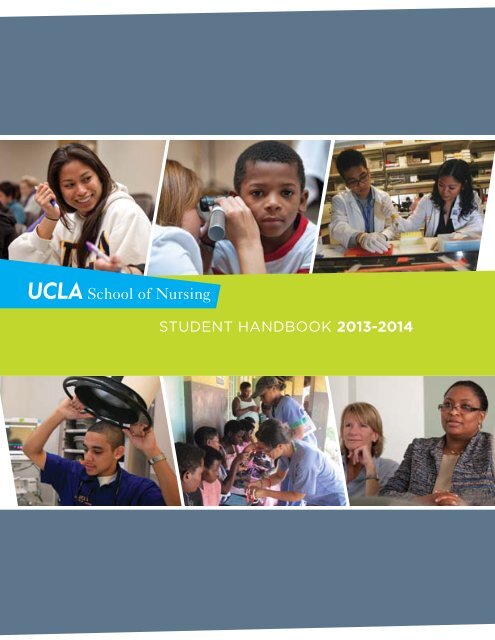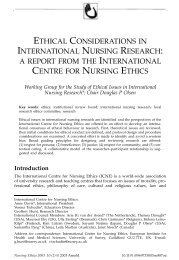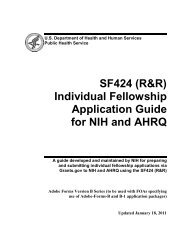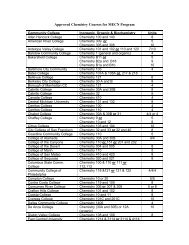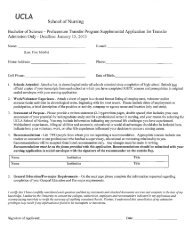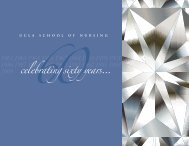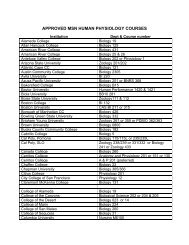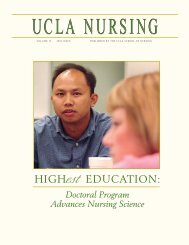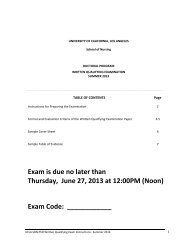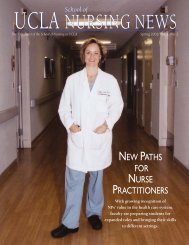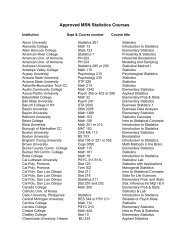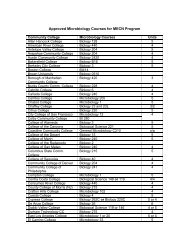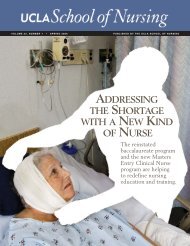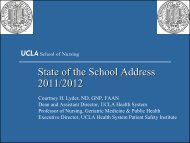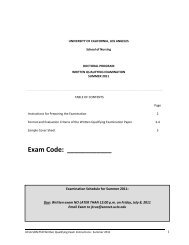student handbook 2013-2014 - UCLA School of Nursing
student handbook 2013-2014 - UCLA School of Nursing
student handbook 2013-2014 - UCLA School of Nursing
You also want an ePaper? Increase the reach of your titles
YUMPU automatically turns print PDFs into web optimized ePapers that Google loves.
University <strong>of</strong> California, Los Angeles<strong>School</strong> <strong>of</strong> <strong>Nursing</strong>Factor BuildingBox 951702Los Angeles, CA 90095-1702Dear <strong>Nursing</strong> Student:Welcome to the University <strong>of</strong> California Los Angeles (<strong>UCLA</strong>) <strong>School</strong> <strong>of</strong> <strong>Nursing</strong>! We areindeed happy you are here.The <strong>UCLA</strong> <strong>School</strong> <strong>of</strong> <strong>Nursing</strong> enjoys a national and international reputation for excellencein teaching, research and clinical practice. Our two prelicensure programs, the Bachelors<strong>of</strong> Science and Masters Entry to Clinical <strong>Nursing</strong>, are designed to prepare not onlycompassionate and competent bedside nurses, but also highly educated pr<strong>of</strong>essionalswith the skills and knowledge necessary to become future nursing leaders. Both programsprepare <strong>student</strong>s for registered nurse (RN) licensure to function in multicultural complexenvironments <strong>of</strong> hospitals and other health-care delivery settings. The Master’s <strong>of</strong> Science in<strong>Nursing</strong> Advanced Practice program provides baccalaureate prepared RNs with advancedskills and clinical training to sit for certification and function as nurse practitioners, clinicalnurse specialists, and nurse administrators. Finally, our PhD program prepares outstandingnurse scholars and scientists who continue to contribute to nursing knowledge. Regardless<strong>of</strong> the program you have entered, you will surely benefit from the unparalleled faculty andacademic community <strong>of</strong> the <strong>UCLA</strong> <strong>School</strong> <strong>of</strong> <strong>Nursing</strong>.This Handbook has been prepared to inform you about the <strong>School</strong> <strong>of</strong> <strong>Nursing</strong> and Universitypolicies. As a <strong>student</strong>, you are responsible for these policies. Please read them carefully.These materials are also available on <strong>UCLA</strong> <strong>School</strong> <strong>of</strong> <strong>Nursing</strong> website.We very much look forward to supporting you as you embark on this exciting academicand pr<strong>of</strong>essional journey.Much Success,Courtney Lyder, RNPr<strong>of</strong>essor & Dean
TABLE OF CONTENTSHISTORY OF THE SCHOOL..................................................................................................1PHILOSOPHY OF THE <strong>UCLA</strong> SCHOOL OF NURSING.......................................................2MISSION OF THE <strong>UCLA</strong> SCHOOL OF NURSING...............................................................3ACCREDITATION.................................................................................................................. 3NONDISCRIMINATION/AFFIRMATIVE ACTION POLICY...................................... 4PRE-LICENSURE PROGRAMS: BACHELOR OF SCIENCE (BS) andMASTERS OF SCIENCE NURSING-MASTER’S ENTRY CLINICAL NURSE(MSN-MECN)..........................................................................................................................5PURPOSE................................................................................................................................ 5BACHELOR OF SCIENCE (BS) DEGREE PROGRAM.........................................................6PROGRAM GOALS............................................................................................................... 6BS PROGRAM CURRICULUM PLAN............................................................................. 7BS GRADING POLICY......................................................................................................... 9Grading Scale................................................................................................................. 9BS PROGRESSION............................................................................................................... 9MSN-MASTER’S ENTRY CLINICAL NURSE (MSN-MECN)PRE-LICENSURE PROGRAM................................................................................................11PROGRAM GOALS............................................................................................................... 11MSN-MECN PROGRAM CURRICULUM PLAN........................................................... 12MSN-MECN GRADING POLICY....................................................................................... 14Grading Scale................................................................................................................. 14MSN-MECN PROGRESSION............................................................................................. 14ASSESSMENTS AND EXAMINATIONS FOR PRELICENSURE PROGRAMS....................15PERIODIC ASSESSMENTS AND EXAMINATIONS................................................... 15PURPOSE................................................................................................................................ 15KAPLAN LEVEL/COURSE EXAMINATION................................................................. 15Scheduling....................................................................................................................... 15Mastery Score................................................................................................................. 17Practicing for the KAPLAN Exams......................................................................... 17KAPLAN Exit Examination (RN Comprehensive Predictor)................................ 17MECN WRITTEN COMPREHENSIVE EXAMINATION............................................. 17POST-LICENSURE PROGRAMS IN THE SCHOOL OF NURSING......................................18DOCTOR OF PHILOSOPHY (Ph.D.) DEGREE IN NURSING..............................................18MASTERS OF SCIENCE NURSING-ADVANCED PRACTICE NURSE (APN)/POST-LICENSURE..................................................................................................................18PROGRAM GOALS............................................................................................................... 19
ADVANCED PRACTICE NURSE (APN)/POST-LICENSURE..............................................20OVERVIEW OF MSN-APN/POST-LICENSURE COURSE REQUIREMENTS.... 20MASTERS IN BUSINESS ADMINISTRATION/MASTER OF SCIENCE INNURSING/POST-LICENSURE CONCURRENT DEGREE PROGRAM................. 25MSN-APN/POST-LICENSURE GRADING POLICY................................................... 25MSN-APN/POST-LICENSURE PROGRESSION.......................................................... 25MSN-APN WRITTEN COMPREHENSIVE EXAMINATION...................................... 26GENERAL ACADEMIC POLICIES FOR THE SCHOOL OF NURSING...............................27GRADING AND BEHAVIOR POLICY............................................................................. 27Posting <strong>of</strong> Grades and/or Distribution <strong>of</strong> Exams............................................. 27APPEAL PROCESS FOR GRADES AND PROGRESSION THROUGHTHE PROGRAM..................................................................................................................... 27EXPECTATIONS FOR BEHAVIOR................................................................................... 28ESSENTIAL FUNCTIONS OF A NURSING STUDENT............................................. 28COMMITMENT TO LEARNING......................................................................................... 30CLINICAL EDUCATION.........................................................................................................31SKILLS/SIMULATION LABORATORY........................................................................... 31CLINICAL COURSE WORK............................................................................................... 31DOCUMENTATION OF INAPPROPRIATE BEHAVIOR OR UNSAFECLINICAL PRACTICE.......................................................................................................... 32ISSUING AN ANECDOTAL NOTE................................................................................... 32ELIGIBILITY FOR CLINICAL PRACTICE: ALL PROGRAMS.................................. 33Health Evaluation.......................................................................................................... 33General............................................................................................................... 33Physical Exam................................................................................................... 33Tuberculosis Evaluation................................................................................. 33Immunization Status....................................................................................... 34Basic Life Support Cardio Pulmonary Resuscitation (BLS/CPR)..... 34R.N. License: MSN-APN Students............................................................... 34Background Check.......................................................................................... 34HIPAA Privacy and Security Screening..................................................... 35Insurance............................................................................................................ 35PERSONAL APPEARANCE AND CONDUCT......................................................................36HYGIENE.................................................................................................................................. 36NURSING UNIFORM AND DRESS CODES: PRELICENSURE............................................36PERSONAL APPEARANCE AND PROFESSIONAL CLOTHING:MSN-APN/POST-LICENSURE...............................................................................................37CLINICAL AGENCY RULES...................................................................................................37CONFIDENTIALITY................................................................................................................38
HEALTH SITUATIONS INCREASING RISK IN THE CLINICAL SETTING..........................39INJURED WHILE AT CLINICAL....................................................................................... 39<strong>UCLA</strong> SON POLICIES ON HIV/AIDS.............................................................................. 39STUDENT - FACULTY COMMUNICATION...........................................................................40FACULTY ADVISEMENT.................................................................................................... 40ATTENDANCE POLICIES......................................................................................................40ABSENCES AND PUNCTUALITY................................................................................... 40Theory Courses.............................................................................................................. 40Clinical Courses in the Pre-licensure Programs................................................ 41STUDENT INFORMATION.....................................................................................................42ACADEMIC INTEGRITY & STUDENT CONDUCT...................................................... 42FINANCIAL ASSISTANCE................................................................................................. 42STUDENT INVOLVEMENT IN SCHOOL OF NURSING COMMITTEES.............. 42CURRICULUM COMMITTEE.............................................................................................. 42STUDENT AFFAIRS COMMITTEE................................................................................... 43CAMPUS SERVICES............................................................................................................. 43Student Health............................................................................................................... 43Counseling & Psychological Services (CAPS)................................................... 43Office for Students with Disabilities...................................................................... 43<strong>UCLA</strong> Recreation.......................................................................................................... 44Bruin Online.................................................................................................................... 44Housing............................................................................................................................. 44Parking and Transportation...................................................................................... 44Police................................................................................................................................. 44Emergency Plan............................................................................................................ 45Emergency Services.................................................................................................... 45Emergency Telephone Lines.................................................................................... 45ELIGIBILITY FOR LICENSURE.............................................................................................45ELIGIBILITY FOR ADVANCED PRACTICE CERTIFICATION............................................45CHANGES TO POLICY AND/OR CURRICULUM REQUIREMENTS..................................45
HISTORY OF THE SCHOOLIn 1949, the Regents <strong>of</strong> the University <strong>of</strong> California authorized the <strong>School</strong> <strong>of</strong> <strong>Nursing</strong> as one<strong>of</strong> the pr<strong>of</strong>essional schools <strong>of</strong> the <strong>UCLA</strong> Center for the Health Sciences. This action paved theway in 1950 for the opening <strong>of</strong> an undergraduate program in nursing leading to the Bachelor<strong>of</strong> Science (BS) degree and made possible the establishment <strong>of</strong> a graduate program toaward a Master <strong>of</strong> Science (MS) degree in <strong>Nursing</strong> in 1951. In 1966, the Master <strong>of</strong> <strong>Nursing</strong> (MN)degree was established as an alternate option to the MS degree. The MS degree program wasdiscontinued in 1969. The Regents approved the Doctor <strong>of</strong> <strong>Nursing</strong> Science (DNSc) degreeprogram in 1986, and in 1987 the first doctoral <strong>student</strong>s were admitted. In 1996, the Office <strong>of</strong>the President and the Regents approved the change in the master’s degree designation fromMN to Master <strong>of</strong> Science in <strong>Nursing</strong> (MSN); the change in doctoral degree designation fromDNSc to PhD in <strong>Nursing</strong> was approved in 1995.To meet the educational needs <strong>of</strong> <strong>student</strong>s who are registered nurses with Associate Degreesor diplomas in nursing, the original BS program curriculum was revised in 1997 and the RN toBS Bridge Program continued until 2010.In 2006, the <strong>School</strong> <strong>of</strong> <strong>Nursing</strong> reinstated the pre-licensure bachelor’s program (BS/Prelicensure) with admission at the freshman level. At the same time, the Master’s Entryinto Clinical Nurse (MECN)/pre-licensure program within the MSN degree programdesigned for pre-licensure <strong>student</strong>s with bachelor’s degrees in another disciplinewas approved.F13-S14 | page 1
PHILOSOPHY OF THE<strong>UCLA</strong> SCHOOL OF NURSINGThe <strong>UCLA</strong> <strong>School</strong> <strong>of</strong> <strong>Nursing</strong> is guided by a philosophy that embodies the mission and goals<strong>of</strong> the University <strong>of</strong> California. The philosophy addresses nursing, the clients <strong>of</strong> nursing, andnursing <strong>student</strong>s. The school is committed to an interdisciplinary learning environment.<strong>Nursing</strong> encompasses clinical practice, education, research, consultation, leadership,management and service to the pr<strong>of</strong>ession and both the local and global communities.It involves individuals, families, groups, organizations, and communities as clients. Thepr<strong>of</strong>ession must consider the human, physical and social environments that interact with theseclients, who may have health conditions that range from wellness to illness. <strong>Nursing</strong> activitiesmust, therefore, include health promotion and maintenance, intervention and treatment,rehabilitation and restoration, and palliation. At an advanced practice level, nursing involvescomprehensive health care, which encompasses the responsibility and accountability forcontinuity <strong>of</strong> care across the health-illness spectrum.<strong>Nursing</strong> research is both applied and basic and has as its core actual or potential humanresponses to illness and as its goal the development <strong>of</strong> nursing science. Guided by ethicalstandards that consider the perspectives <strong>of</strong> the client, the health care provider and the largersociety, nursing has a social mission that encompasses the right and responsibility to provideleadership in health policy, as well as health care to all clients regardless <strong>of</strong> disease status,gender, race or culture.People who receive client-centered nursing care are complex individuals who exist inrelationship to others in their family and community. This complexity <strong>of</strong> person involvesbiological, behavioral, emotional, psychosocial, cultural and spiritual dimensions. Eachindividual reflects a unique combination <strong>of</strong> these dimensions that interacts dynamically withthe environment. The clients <strong>of</strong> nursing are autonomous decision makers who have certainvalues and knowledge about themselves that not only are relevant, but also essential tosuccessful health care outcomes. As a result, nurses have the responsibility to protect thepatient’s right to collaboratively participate with health care pr<strong>of</strong>essionals involved in their care.Successful nursing <strong>student</strong>s are active learners who bring unique gender, cultural and ethniclife experiences to the pr<strong>of</strong>essional practice <strong>of</strong> nursing and its advancement as a discipline.Students at all levels learn relevant theory, acquire practice skills and are socialized into thepr<strong>of</strong>ession <strong>of</strong> nursing. Increasing levels <strong>of</strong> complexity and sophistication <strong>of</strong> learning andsocialization are expected <strong>of</strong> <strong>student</strong>s in the different programs. Whether at the beginningpractice, advanced practice, or scholar level, nursing <strong>student</strong>s learn to apply knowledge, skillsand pr<strong>of</strong>essional attitudes in their work, which may include educative, administrative andresearch arenas. While <strong>student</strong>s have the right and responsibility to participate in their ownlearning, faculty members have the right and responsibility to structure the teaching/learningenvironment to facilitate learning. Individual academic counseling and a variety <strong>of</strong> one-on-one,small-group, and interactive learning formats assist <strong>student</strong>s to meet program and individuallearning goals.F13-S14 | page 2
MISSION OF THE <strong>UCLA</strong> SCHOOL OF NURSINGThe mission <strong>of</strong> the <strong>UCLA</strong> <strong>School</strong> <strong>of</strong> <strong>Nursing</strong> is to advance nursing science through the conductand dissemination <strong>of</strong> research and expand its national and international leadership in theeducational preparation <strong>of</strong> nurses. The school is committed to preparing scholarly and highlyqualified nurses at all levels for the provision <strong>of</strong> quality nursing care for a diverse, multiculturalsociety. The mission <strong>of</strong> the school focuses on three areas: education, research and practice.The dominant mission is education <strong>of</strong> nurses at the undergraduate, master’s and doctorallevels. At the bachelor’s level, nurses are prepared as generalists with special skills in primary,secondary and tertiary prevention and care within a population-based context, leadership,and evidence-based practice. At the master’s level, nurses are prepared as generalists inhospital-based care or for advanced nursing practice as nurse practitioners, clinical specialistsor administrators in a variety <strong>of</strong> settings and specialized areas <strong>of</strong> healthcare. At the doctorallevel, <strong>student</strong>s are prepared as emerging scholars to advance nursing knowledge and sciencethrough systematic research. As graduates <strong>of</strong> the programs, all <strong>student</strong>s are prepared t<strong>of</strong>unction as leaders in academic, healthcare and governmental/policy settings.Advancing nursing science through significant and methodologically rigorous research isa critical component <strong>of</strong> the school’s mission. The school is recognized as being one <strong>of</strong> thetop schools <strong>of</strong> nursing in the country. The faculty is committed to increasing its standing innational and international research arenas. To this end, the faculty continues collaborativerelationships with scientists and clinicians in other schools and departments at <strong>UCLA</strong>, withinthe University <strong>of</strong> California, at other university campuses and at cooperative, clinical andresearch-oriented institutions locally, regionally and internationally.The promotion <strong>of</strong> expert clinical practice is inherent with the mission and encompassescontributions <strong>of</strong> clinical expertise and knowledge to the community. This is accomplishedby sharing innovations in nursing care and health promotion and by the participation <strong>of</strong> thefaculty in the delivery <strong>of</strong> expert nursing care to special populations, including the underservedand vulnerable populations.ACCREDITATIONThe <strong>UCLA</strong> <strong>School</strong> <strong>of</strong> <strong>Nursing</strong> programs <strong>of</strong> study are approved by the Academic Senate <strong>of</strong>the University <strong>of</strong> California, the California Board <strong>of</strong> Registered <strong>Nursing</strong>, and are accredited bythe Commission on Collegiate <strong>Nursing</strong> Education (CCNE). Curricular oversight and periodicreviews are conducted by the <strong>UCLA</strong> Academic Senate’s Undergraduate and GraduateCouncils. The University <strong>of</strong> California, Los Angeles holds accreditation from the WesternAssociation <strong>of</strong> <strong>School</strong>s and Colleges (WASC). In 2010, the Commission on Collegiate <strong>Nursing</strong>Education (CCNE) accredited the existing bachelor’s and master’s degree programs for a term<strong>of</strong> 10 years.F13-S14 | page 3
NONDISCRIMINATION/AFFIRMATIVEACTION POLICYThe University <strong>of</strong> California, in accordance with applicable Federal and State Laws andUniversity Policies, does not discriminate on the basis <strong>of</strong> race, color, national origin, religion,sex, gender identity, pregnancy (including pregnancy, childbirth, post-partum period andmedical conditions related to pregnancy and childbirth), disability, age, medical condition(cancer-related), ancestry, marital status, citizenship, sexual orientation, or status as a Vietnameraveteran or special disabled veteran. The University also prohibits sexual harassment.This nondiscrimination policy covers admission, access, and treatment in University programsand activities.Students can obtain information or submit a complaint <strong>of</strong> any action which they believediscriminates against them on the grounds <strong>of</strong> race, color, national origin, marital status, sex,sexual orientation, disability or age to the Office <strong>of</strong> the Dean <strong>of</strong> Students, 1206 Murphy Hall,310.825.3871.For further information and procedures visit the UC Regents website.The UC Policy on Sexual Harassment via the Office <strong>of</strong> the Dean <strong>of</strong> Students defines andelaborates on sexual harassment policies and complaint resolutionThe Discrimination and Harassment Policy at <strong>UCLA</strong> defines and describes theNondiscrimination and Harassment Policy and Sexual Harassment.F13-S14 | page 4
PRE-LICENSURE PROGRAMS:BACHELOR OF SCIENCE (BS) & MASTER OF SCIENCE NURSING-MASTER’S ENTRY CLINICAL NURSE (MSN-MECN)PURPOSEThe purpose <strong>of</strong> the pre-licensure nursing programs at the University <strong>of</strong> California at LosAngeles <strong>School</strong> <strong>of</strong> <strong>Nursing</strong> is to prepare graduates to provide therapeutic nursing care toall entrusted to care regardless <strong>of</strong> race/ethnicity, age, gender, culture, religion or social status.At the pre-licensure level, two programs are <strong>of</strong>fered, the Bachelor <strong>of</strong> Science (BS) program andthe Master <strong>of</strong> Science in <strong>Nursing</strong>-Master’s Entry Clinical Nurse (MECN) program.This Handbook provides information to facilitate the progression <strong>of</strong> pre-licensure <strong>student</strong>sin the <strong>UCLA</strong> <strong>School</strong> <strong>of</strong> <strong>Nursing</strong>. Students are also expected to read and utilize informationon the <strong>School</strong> <strong>of</strong> <strong>Nursing</strong> Academic Publications webpage, the <strong>UCLA</strong> General Catalog, theGraduate Division Program and Degree Requirements and the <strong>UCLA</strong> Schedule <strong>of</strong> Classes.F13-S14 F12-S13 | page 5
BACHELOR OF SCIENCE (BS) DEGREE PROGRAMPROGRAM GOALSGraduates <strong>of</strong> the <strong>UCLA</strong> Bachelor <strong>of</strong> Science (BS) program are able to assume responsibilityfor organizing, implementing, and evaluating hospital-, population- and/or community-basedplans <strong>of</strong> nursing care for a highly complex and culturally diverse society. The Pre-licensureprogram prepares <strong>student</strong>s with a focus on primary, secondary and/or tertiary prevention andtreatment. This program integrates concepts <strong>of</strong> multiculturalism and prepares <strong>student</strong>s wellfor the changing healthcare system and the healthcare needs <strong>of</strong> California’s demographicallydiverse population. Students successfully completing this program are prepared as nursegeneralists with special skills to provide nursing care across the lifespan and the graduate iseligible to take the National Council Licensing Examination (NCLEX) to be certified as an RN.Students successfully completing the BS degree also acquire an educational foundation forentry to the graduate program, which at the master’s level prepares advanced practitioners,clinical specialists and administrators in primary and acute care and, at the doctoral level,prepares nurse scientists and scholars.After completing the BS program, graduates achieve the following objectives:1. Select, evaluate and apply appropriate theory and research findings concerningindividual- and population-based health promotion and disease prevention,biobehavioral and health systems, social-environment and cultural and humandiversity to the nursing process with a variety <strong>of</strong> clients, families and communitiesfrom ethnically diverse cultural backgrounds2. Utilize the nursing process to promote biopsychosocial health and disease preventionand to support the resources <strong>of</strong> culturally diverse clients and families in communityand/orhospital-based settings3. Demonstrate effective communication and collaboration skills with clients andtheir families, research participants, other health pr<strong>of</strong>essionals, colleagues andpolicy makers4. Identify practice-based problems and hypotheses and critique research on issues <strong>of</strong>importance to nursing and health care delivery within culturally diverse hospital- andcommunity-based settings5. Participate in pr<strong>of</strong>essional and community organizations and/or interest groupsrelevant to health care delivery and modify nursing standards and practices in keepingwith current trends6. Demonstrate leadership as a member <strong>of</strong> the health team to plan, manage and evaluatecare <strong>of</strong> individuals, families and communities for culturally diverse populations7. Practice hospital- and community-based nursing based on the principles <strong>of</strong> ethicsand lawF13-S14 | page 6
BS PROGRAM CURRICULUM PLANBS Sample Course ScheduleSequence is only a sample and subject to change.First YearFallUnitsN10 2Chem 14A (GE) 4Math 3A or 31A 4English 3/Writing I 5WinterUnitsN20 2Chem 14B (GE) 4Life Science 2 4Liberal Arts GE 5SpringUnitsChem 14C 4GE (Com or Psych) 5N13 Anatomy (GE) 5SummerUnitsTotal 15Total 15Total 14Second YearFallUnitsN50 4Life Science 3 4GE (Com or Psych) 5WinterUnitsBiostat 100A 4Liberal Arts GE 5N3 Physiology 5SpringUnitsN54A 3N173 4Microbiology 10 4GE (Com or Psych) 5SummerUnitsTotal 13Total 14Total 16Third YearFallUnitsN54B 2N152W 5N150A3 T+1 CN162A3 T+1 CWinterUnitsN174 4N115 4N150B3 T+1 CN162B4 T+2 CSpringUnitsN160 4N162C4 T+4 CSummerN164N165Units3 T+2 C3 T+2 CTotal 15Total 19Total 12Total 10Fourth YearFallUnitsN1613 T+2 CElective 4Liberal Arts GE 5WinterUnitsN168 5N1713 T+3 CN162D3 T+1 CSpringN169Units12 CSummerUnitsTotal 14Total 15Total 12T: Theory UnitsC: Clinical UnitsThe Bachelor <strong>of</strong> Science degree must be completedwithin the 180-216 unit limit.F13-S14 | page 7
BS <strong>Nursing</strong> CoursesCoursenumberCourse Name Theory Clinical Total QuarterN3 Human Physiology 5 units 5 units Winter Year 2N13 Introduction to Human Anatomy 5 units 5 units Spring Year 1N10 Introduction to <strong>Nursing</strong> and Social Justice I 2 units 2 units Fall Year 1N20 Introduction to <strong>Nursing</strong> and Social Justice II 2 units 2 units Winter Year 1N50 Fundamentals <strong>of</strong> Epidemiology 4 units 4 units Winter Year 2N54A Pathophysiology I 3 units 3 units Spring Year 2N54B Pathophysiology II 2 units 2 units Fall Year 3N115 Pharmacology and Therapeutics 4 units 4 units Winter Year 3N150A Fundamentals <strong>of</strong> Pr<strong>of</strong>essional <strong>Nursing</strong> 3 units 1 unit 4 units Fall Year 3N150B Fundamentals <strong>of</strong> Pr<strong>of</strong>essional <strong>Nursing</strong> 3 units 1 unit 4 units Winter Year 3N152WHuman Development/Health Promotion inCulturally Diverse Populations5 units 5 units Fall Year 3N160 Secondary Prevention 4 units 4 units Spring Year 3N161 Mental Health <strong>Nursing</strong> 5 units 5 units Fall Year 4N162A Medical-Surgical A 3 units 1 unit 4 units Fall Year 3N162B Medical-Surgical B 4 units 2 units 6 units Winter Year 3N162C Medical-Surgical C / Gerontology 4 units 4 units 8 units Spring Year 3N162D Critical Care 3 units 1 unit 4 units Winter Year 4N164 Maternity <strong>Nursing</strong> 3 units 2 units 5 units Summer Year 3N165 Pediatric <strong>Nursing</strong> 3 units 2 units 5 units Summer Year 3N168 Advanced Leadership and Role Integration 5 units 5 units Winter Year 4N169 Clinical Internship: Integration 12 units 12 units Spring Year 4N171 Public Health <strong>Nursing</strong> 3 units 3 units 6 units Winter Year 4N173 Introduction to Research 4 units 4 units Spring Year 2N174 Physical Assessment 4 units 4 units Winter Year 3F13-S14 | page 8
BS GRADING POLICYGRADING SCALEThe grading scale is consistent with the grading scale at <strong>UCLA</strong> and is also consistent for eachnursing course.Percentage Letter Grade97-100 A+94-96 A90-93 A-87-89 B+84-86 B80-83 B-77-79 C+74-76 C70-73 C-67-69 D+65-68 D60-64 D-
components <strong>of</strong> the course and achieve a “C” (74% or better) to pass the course andprogress to the next set <strong>of</strong> linked nursing theory and clinical course(s). If a <strong>student</strong>receives a grade <strong>of</strong> “C-” or below in any nursing course, he or she is required to repeatthe course and achieve a passing grade.6. A <strong>student</strong> is only permitted to repeat one nursing course in the process <strong>of</strong> completingthe BS program. The <strong>student</strong> may retake one course; however, if the <strong>student</strong> receivesbelow passing in that course again, or subsequently fails to pass any other nursingcourse, the <strong>student</strong> may not continue in the program.7. A <strong>student</strong> may not drop a nursing course (NXX or NXXX) to avoid receiving a failinggrade. Students must seek counsel from their faculty advisors, course instructor, theAssistant Dean for Student Affairs or the Associate Dean for Academic Affairs beforedropping a course.8. A pre-major science course, taken before the last two years <strong>of</strong> study, may be repeatedonly once; however, a <strong>student</strong> can repeat more than one pre-major science course toa maximum <strong>of</strong> sixteen (16) units. If a <strong>student</strong> completed a science course more thanseven years ago, this science course must be repeated and this does not count asrepeating a course for progression.F13-S14 | page 10
MSN-MASTER’S ENTRY CLINICAL NURSE (MSN-MECN) PRE-LICEN-SURE PROGRAMPROGRAM GOALSThe Master <strong>of</strong> Science in <strong>Nursing</strong>-Master’s Entry Clinical Nurse (MSN-MECN) program optionis designed to produce nurse generalists with special leadership skills and cultural competencywho assume accountability for healthcare outcomes for a specific group <strong>of</strong> clients throughthe assimilation and application <strong>of</strong> evidence-based research. These nurses function in theacute hospital-based setting as well as a variety <strong>of</strong> community settings. MSN-MECN nursesapply core concepts <strong>of</strong> ethical and social justice, research, primary, secondary and tertiaryprevention, advanced research and systems theory, and health care policy to their role asprovider and manager <strong>of</strong> care at the point <strong>of</strong> care to individuals and cohorts. After programcompletion, the MSN degree is awarded and the graduate is eligible to take the NationalCouncil Licensing Examination (NCLEX) to be certified as an RN. Graduates are prepared toimplement outcomes-based practice and quality improvement in clinical settings.After completing the MSN-MECN, graduates are able to complete the following objectives:1. Select, evaluate and apply, in an acute hospital and a variety <strong>of</strong> other settings, basicand advanced theoretical knowledge <strong>of</strong> core concepts, including advanced leadershipand health care systems to the nursing process in order to deliver healthcare to clientsfrom ethnically diverse cultural backgrounds2. Analyze health problems at a unit, aggregate (community), and systems level,and develop nursing interventions that balance the health needs at the unit andcohort levels3. Demonstrate effective communication and collaboration skills with clients,research participants, other health pr<strong>of</strong>essionals, colleagues and policy makers4. Evaluate existing nursing and healthcare systems research, apply findings tonursing practice and participate in the development <strong>of</strong> new knowledge5. Demonstrate leadership and system skills and critical thinking that contribute tothe effectiveness and efficiency <strong>of</strong> nursing and health care6. Practice hospital- and community-based nursing, based on the principles <strong>of</strong>ethics and law7. Participate in pr<strong>of</strong>essional and community organizations and/or interest groupsrelevant to healthcare delivery and modify nursing standards and practices inkeeping with current trendsF13-S14 | page 11
MSN-MECN PROGRAM CURRICULUM PLANMSN-MECN Sample Course SchedulePlease note that this is only a sample and subject to change.First YearFallUnitsN230A 3N250 5N252 4N254A3 T+1 CWinterUnitsN174 4N225A 3N230B 2N254B3 T+1 CN465A3 T+1 CSpringUnitsN204 4N225B 2N260 4N266 3N465B4 T+2 CSummerN461N465CUnits3 T+2 C4 T+4 CTotal 16Total 17Total 19Total 13Second YearFallUnitsN269 4N4623 T+2 CN4643 T+2 CN465D3 T+1 CWinterUnitsN467 12SpringUnitsN1713 T+3 CN267 3N268 4N597 2SummerUnitsTotal 18Total 12Total 15NURSING CORE COURSESCoursenumberCourse Name Total QuarterN225A Advanced Pharmacology I 3 units Winter Year 1N225B Advanced Pharmacology II 2 units Spring Year 1N230A Advanced Pathophysiology I 3 units Fall Year 1N230B Advanced Pathophysiology II 2 units Winter Year 1N250 Ethical Issues, Social Justice, and History <strong>of</strong> <strong>Nursing</strong> 5 units Fall Year 1Research CoursesCoursenumberCourse Name Total QuarterN204 Research Design and Critique 4 units Spring Year 1N597 Individual Study for Comprehensive Examination 2 units Spring Year 2F13-S14 | page 12
Administrative CoursesCoursenumberCourse Name Total QuarterN266 Health Care Systems/Organizations 3 units Spring Year 1N267 Healthcare Policy 3 units Spring Year 2N268 Systems (Hospital Unit): Individual Level 4 units Spring Year 2N269 Quality Improvement & Population-Based Quality <strong>of</strong> Practice 4 units Fall Year 2Clinical Theory and Practice CoursesCoursenumberCourse Name Total QuarterN171 Public Health <strong>Nursing</strong> 6 units Spring Year 2N174 Physical Assessment 4 units Winter Year 1N252 Health Promotion/Risk Reduction Systems: Population Level 4 units Fall Year 1N254A Theoretical Foundations <strong>of</strong> Master’s Entry Clinical Nurse Role 4 units Fall Year 1N254B Theoretical Foundations <strong>of</strong> MECN Role Fundamentals Lab 4 unit Fall Year 1N260 Secondary Prevention 4 units Spring Year 1N461 Mental Health 5 units Summer Year 1N462 Maternity <strong>Nursing</strong> 5 units Fall Year 1N464 Pediatric <strong>Nursing</strong> 5 units Fall Year 2N465A Medical-Surgical A 4 units Winter Year 1N465B Medical-Surgical B 6 units Spring Year 1N465C Medical-Surgical C/Gerontology 8 units Summer Year 1N465D Critical Care 4 units Fall Year 2N467 Clinical Internship: Integration 12 units Winter Year 2F13-S14 | page 13
MSN-MECN GRADING POLICYGRADING SCALEThe recommended grading scale for the Graduate Division at <strong>UCLA</strong> and the <strong>School</strong> <strong>of</strong> <strong>Nursing</strong>is as follows:Percentage Letter Grade97-100 A+94-96 A90-93 A-87-89 B+84-86 B80-83 B-77-79 C+74-76 C73 C-84%) to pass the courseand progress to the next theory-clinical course(s). If a <strong>student</strong> does not receivea grade <strong>of</strong> “B”, >84%, she or he will repeat the theory-clinical course during thenext academic year.5. For designated nursing courses N252, N260, N225AB, N230AB, <strong>student</strong>s mayprogress within the program if a grade <strong>of</strong> a “C” (i.e., a score >74%) is earned.6. A <strong>student</strong> is only permitted to repeat one nursing course in the process <strong>of</strong>completing the MECN program. The <strong>student</strong> may retake one course; however, ifthe <strong>student</strong> receives below passing in that course again, or subsequently fails topass any other nursing course, the <strong>student</strong> may not continue in the program.7. A <strong>student</strong> may not drop a nursing course to avoid receiving a failing grade. Studentsmust seek counsel from their faculty advisor, course instructor, the Assistant Dean forStudent Affairs or the Associate Dean for Academic Affairs before dropping a course.F13-S14 | page 14
ASSESSMENTS AND EXAMINATIONS FORPRE-LICENSURE PROGRAMSPERIODIC ASSESSMENTS AND EXAMINATIONSPURPOSEThe Kaplan exams are administered to <strong>School</strong> <strong>of</strong> <strong>Nursing</strong> pre-licensure nursing <strong>student</strong>s toassess whether each <strong>student</strong> has acquired the necessary skills and knowledge to successfullypass the respective content areas on the RN-NCLEX. These tests are administered ascoursework is completed and at the end <strong>of</strong> the program. Participation in the Kaplan testingprogram is mandatory for all pre-licensure nursing <strong>student</strong>s. The cost <strong>of</strong> exam and reviewmaterials are the responsibility <strong>of</strong> each nursing <strong>student</strong>. The current cost <strong>of</strong> the Kaplan testingprogram and accompanying materials is $450. The fee for in-program examination materialsdoes include access to NCLEX-RN® Prep <strong>of</strong>fered by Kaplan <strong>Nursing</strong> following graduation.KAPLAN LEVEL/COURSE EXAMINATIONSCHEDULING: Each <strong>student</strong> must plan to be present on the days in which the respectiveKaplan Level/Course examinations are administered. The schedule indicates the timeframewhen the respective exams are administered. Students may not lobby to pressure faculty orother <strong>student</strong>s to change test dates. Tests are scheduled during finals week <strong>of</strong> the specifiedquarters, and <strong>student</strong>s should plan personal commitments and travel so that they can attendthe examination. While the Kaplan examination scores do not contribute to course grades,a <strong>student</strong> will not have completed the corresponding course until the Kaplan Examination iscompleted. The course syllabus for any given quarter will contain the exact date when theKaplan Level/Course Examination is administered.F13-S14 | page 15
Exam administered atthe conclusion <strong>of</strong> thecorresponding course:Mastery Score(Minimum)BSCorresponding CourseTIMINGFundamentals 68% N150A Fundamentals A Fall Year 3Fundamentals 68% N150B Fundamentals B Winter Year 3Pharmacology 70% N162C Med-Surg C Spring Year 3Medical-Surgical Comprehensive 75% N162C Med-Surg C Spring Year 3Pediatric <strong>Nursing</strong> 65% N165 Pediatrics Summer Year 3OB <strong>Nursing</strong>, including growthand development72-74% N164 Maternity Summer Year 3Psychosocial <strong>Nursing</strong> 68% N161 Mental Health Fall Year 4Management/Pr<strong>of</strong>essional Issues75% N168 Leadership Role Winter Year 4Community Health 52% N171 Public Health <strong>Nursing</strong> Winter Year 4Comprehensive 69% N169 Immersion Spring Year 4Exam administered atthe conclusion <strong>of</strong> thecorresponding course:Mastery Score(Minimum)MSN-MECNCorresponding CourseTimingFundamentals 68% N254A Fundamentals A Fall Year 1Fundamentals 68% N254B Fundamentals B Winter Year 1Pharmacology 70% N465C Med-Surg C Summer Year 1Medical-Surgical Comprehensive 75% N465C Med-Surg C Summer Year 1Psychosocial <strong>Nursing</strong> 68% N461 Mental Health Summer Year 1Pediatric <strong>Nursing</strong> 65% N464 Pediatrics Fall Year 2OB <strong>Nursing</strong>, including growthand development72-74% N462 Maternity Fall Year 2Management/Pr<strong>of</strong>essional Issues75% N268 Systems Spring Year 2Community Health 52% N171 Public Health <strong>Nursing</strong> Spring Year 2Comprehensive 69% N171 Public Health <strong>Nursing</strong> Spring Year 2F13-S14 | page 16
MASTERY SCORE: If <strong>student</strong>s receive scores that indicate less than mastery <strong>of</strong> the material,they are responsible for contacting their advisor to discuss how they will plan for remediation.PRACTICING FOR THE KAPLAN EXAMS:To assure the success <strong>of</strong> each <strong>student</strong> in taking theKaplan course/level examinations, Kaplan has made available online practice examinations andremediation tools to prepare <strong>student</strong>s. Students should refer to the Kaplan website to accessand take these practice exams.KAPLAN EXIT EXAMINATION (RN COMPREHENSIVE PREDICTOR): The Kaplan ExitExamination is administered at the end <strong>of</strong> the <strong>student</strong>’s final clinical course, and serves as avaluable assessment tool to determine the level <strong>of</strong> knowledge and skill <strong>of</strong> the nursing <strong>student</strong>near the end <strong>of</strong> the BS or MECN program. The price <strong>of</strong> the Kaplan exam encompasses theclasses, exam and post-graduate review. The Kaplan exams are administered to SONpre-licensure nursing <strong>student</strong>s as periodic assessments as to whether each <strong>student</strong> hasacquired the necessary skills and knowledge to successfully pass the respective contentareas on the RN-NCLEX. These tests are administered both at the course level and at thecomprehensive level. Examinations are linked to courses (e.g., Maternity theory and clinicalwill be administered at the end <strong>of</strong> the corresponding academic quarter as the course <strong>of</strong>fering).MECN WRITTEN COMPREHENSIVE EXAMINATIONPursuant to requirements <strong>of</strong> the <strong>UCLA</strong> graduate division for graduation, the written Master’sComprehensive Examination is administered in the second year <strong>of</strong> study. Written instructionsare distributed to <strong>student</strong>s at least 10 weeks in advance <strong>of</strong> the (examination) due date. Each<strong>student</strong> completes the Comprehensive Examination out <strong>of</strong> class and independently. A passingscore is 70% or more <strong>of</strong> possible points. The Comprehensive Examination may be attemptedthree times. The two retakes will be scheduled during the summer and fall quarters. Lateexaminations are not accepted for grading, will count as an attempt at passing, and will begiven a failing grade.Students who fail to achieve a passing score on their first attempt are eligible to participatein commencement ceremonies. However, the degree will be awarded in the quarter duringwhich the Comprehensive Examination is passed.Successful completion <strong>of</strong> the Master’s Comprehensive Examination is a requirement for“completion <strong>of</strong> required nursing curriculum.” Students will not be certified to any Board<strong>of</strong> Registered <strong>Nursing</strong> as having completed nursing course requirements until they havesuccessfully completed the Master’s Comprehensive Examination.F13-S14 | page 17
POST-LICENSURE PROGRAMS INTHE SCHOOL OF NURSINGDOCTOR OF PHILOSOPHY (PH.D.) DEGREE IN NURSINGThe goal <strong>of</strong> the <strong>UCLA</strong> <strong>School</strong> <strong>of</strong> <strong>Nursing</strong> Doctor <strong>of</strong> Philosophy (PhD) degree program is todevelop the foundation <strong>of</strong> knowledge upon which the practice <strong>of</strong> the pr<strong>of</strong>ession is basedthrough the conduct <strong>of</strong> original research and the generation <strong>of</strong> theory. Its purpose is toproduce independent investigators who can conduct biobehavioral research, biologic scienceresearch, health disparities/vulnerable populations research or health services research. Theseresearch foci will advance the state <strong>of</strong> knowledge about how pr<strong>of</strong>essional nursing practice andthe delivery <strong>of</strong> health services can be improved.For more information about the PhD program, see the <strong>UCLA</strong> <strong>School</strong> <strong>of</strong> <strong>Nursing</strong> PhD Guidelines.MASTER’S OF SCIENCE NURSING-ADVANCED PRACTICENURSE (APN)/POST-LICENSUREThe <strong>School</strong> <strong>of</strong> <strong>Nursing</strong> <strong>of</strong>fers graduate studies and preparation in the Nurse Administratorrole, the Advanced Practice Nurse Practitioner role, or the Clinical Nurse Specialist role. Thefollowing specialties are available for the nurse administrator role: <strong>Nursing</strong> Administrationor <strong>Nursing</strong> Administration/Occupational and Environmental Health. Advanced Practice isdivided into four distinct population foci: Adult/Gerontology Primary Care, Adult/GerontologyAcute Care, Family and Pediatrics. Adult/Gerontology Acute Care <strong>student</strong>s may also selecta specialty in Oncology. Adult/Gerontology Acute Care and Pediatrics <strong>student</strong>s may selecteither the nurse practitioner, clinical nurse specialist or the dual nurse practitioner and clinicalnurse specialist role. Students in the Family, Adult/ Gerontology Primary and Occupational andEnvironmental Health specialization are prepared in the Nurse Practitioner role only. Studentsin the family nurse practitioner specialty may take the underserved populations subspecialty.Please note that admissions to the following specialties are temporarily suspended: <strong>Nursing</strong>Administration, <strong>Nursing</strong> Administration/Occupational and Environmental Health, Adult/Gerontology Acute Care Oncology, and the Underserved Populations subspecialty.F13-S14 | page 18
In their practice, MSN-APNs use logic and reason distinguished by intellectual curiosity andindividual creativity. MSN-APNs apply multidisciplinary theories, including nursing, biologic,behavioral, management, social/environmental and organizational to develop, implement andevaluate models <strong>of</strong> patient care and quality <strong>of</strong> services. They are able to competently assess,diagnose, plan, implement, manage and evaluate the care <strong>of</strong> patients, groups <strong>of</strong> patients andfamilies from diverse cultural backgrounds. The curriculum prepares <strong>student</strong>s for careers inadvanced practice or management.Program GoalsAfter completing the MSN-APN Degree within an area <strong>of</strong> advanced practice, graduates achievethe following objectives:1. Evaluate and apply, in a variety <strong>of</strong> settings, advanced theoretical knowledge in order todeliver health care to clients from diverse cultural backgrounds, including organizationsand communities2. Demonstrate communication skills through collaboration with clients inhealth care plans3. Evaluate existing nursing research, utilize research findings in advanced nursingpractice, and participate in the development <strong>of</strong> new knowledge4. Demonstrate leadership skills and critical thinking that contribute to the effectivenessand efficiency <strong>of</strong> nursing and health care5. Develop and maintain a practice environment based on the principles <strong>of</strong> ethics andlaw in which ethical dilemmas are rightfully resolved6. Consult and collaborate with clients and other health pr<strong>of</strong>essionals in thedevelopment, implementation and evaluation <strong>of</strong> healthcare delivery, policies andprograms at the local, state and national levelsIn addition, functional objectives for each area <strong>of</strong> advanced practice for the MSN degreeprovide role preparation for:1. Nurse practitioners to deliver advanced nursing care through the assessment,diagnosis and management <strong>of</strong> health/illness needs in primary health care,assuming responsibility and accountability for the continuity <strong>of</strong> health care inboth health and illness2. Clinical nurse specialists to deliver advanced nursing care in a clinical specialty andperform advanced practice consultative, educative, leadership and research roles ininpatient and outpatient settings3. Nurse administrators to provide leadership and perform administrative roles, includingdirect healthcare administration, risk management, quality improvement, casemanagement, education or research support within acute, long-term, ambulatory andcommunity settings with a focus on improving patient and organizational outcomesF13-S14 | page 19
ADVANCED PRACTICE NURSE(APN)/POST-LICENSUREThe MSN-APN curriculum includes core courses, and additional specialty courses that vary byconcentration. The APN core coursework, as specified in the Essentials <strong>of</strong> Masters Educationfor Advanced Practice <strong>Nursing</strong> (2011), include: N231, Advanced Pathophysiology; N224,Advanced Pharmacology; and N 440, Advanced Assessment and Clinical Diagnosis. Thesecourses are presented in the table below. The number <strong>of</strong> directly supervised clinical practicehours required for the degree ranges from 600-1590. Please note: While 300 clinical hoursin the CNS role is required currently for completion <strong>of</strong> the dual NP/CNS program, it is highlyrecommended that dual NP/CNS <strong>student</strong>s complete a minimum <strong>of</strong> 500 clinical hours in theCNS role to insure their eligibility to sit for national certification exams. Graduates are eligible tosit for national certification examinations in the role and population in which they are prepared.The core and required courses for each program are summarized in the following table:OVERVIEW OF MSN-APN/POST-LICENSURE COURSE REQUIREMENTSPlease note that this is only a sample and subject to change.MSN-APN/Post-licensure Nurse Practitioner Sample Course ScheduleFamily Nurse Practitioner SpecialtyMSN Core CoursesN 200 – Biobehavioral Theoretical Foundations <strong>of</strong>Health AssessmentN 204 – Research Design and CritiqueN 224 – Pharmacology for APNsN 231 – Pathophysiology for APNsN 264 – Pr<strong>of</strong>essional Issues in <strong>Nursing</strong>Specialty Core Concentration CoursesN 211 – Theoretical Foundations <strong>of</strong> Women’sHealth Care during the Reproductive YearsN 212 – Health Related Family TheoryN 236 – Essential Theoretical Foundations <strong>of</strong>Primary Care <strong>of</strong> ChildrenN 239 A, B, C – Assessment and Management <strong>of</strong>Adult Healthcare I, II, IIIN 429 A, B, C, D, E – Family Nurse PractitionerClinical Practicum I, II, III, IV, VN 440 - Advanced Assessment and Clinical Diagnosis IF13-S14 | page 20
Adult/Gerontology Primary Care Nurse PractitionerMSN Core CoursesN 200 – Biobehavioral Theoretical Foundations <strong>of</strong>Health AssessmentN 204 – Research Design and CritiqueN 224 - Pharmacology for APNN 231 – Pathophysiology for Advanced PracticeNursesSpecialty Core Concentration CoursesN 211 – Theoretical Foundations <strong>of</strong> Women’sHealth Care during the Reproductive YearsN 232F – Human Responses to Aging andChronic IllnessN 233F – Human Responses to Aging andChronic IllnessN 439 A, B, C, D, E – Advanced Practice <strong>Nursing</strong>:Clinical Practicum I, II, III, IV, VN 264 – Pr<strong>of</strong>essional Issues in <strong>Nursing</strong>N 440 – Advanced Assessment & Clinical Diagnosis IPEDIATRIC SPECIALTY NURSE PRACTITIONER AND CLINICAL NURSE SPECIALISTMSN Core CoursesN 200 – Biobehavioral Theoretical Foundations <strong>of</strong>Health AssessmentN 204 – Research Design and CritiqueN 224 – Pharmacology for APNN 231 – Pathophysiology for APNN 264 - Pr<strong>of</strong>essional Issues in <strong>Nursing</strong>N 440 – Advanced Assessment & Clinical Diagnosis ISpecialty Core Concentration CoursesN 212 – Health Related Family TheoryN 223 - Childhood Development Research andApplication to <strong>Nursing</strong>N 238 A, B, C – Assessment and Management inPediatric Health Care I, II, and IIIN 245 - Theoretical Foundations for Clinical NurseSpecialist Practice (for CNS and Dual only)N 438 A, B, C, D - Pediatric Nurse PractitionerClinical Practicum I, II, III, IVN 445 = Advanced Practice <strong>Nursing</strong>: Clinical NurseSpecialist Practicum (for CNS and Dual only)Adult/Gerontology Primary Care Occupationaland Environmental Health Nurse Practitioner SPECIALTYMSN Core CoursesN 200 – Biobehavioral Theoretical Foundations <strong>of</strong>Health AssessmentN 204 – Research Design and CritiqueN 224 – Pharmacology for APNN 231 – Pathophysiology for APNN 440 – Advanced Assessment & Clinical Diagnosis ISpecialty Core Concentration CoursesN 213 – Occupational and Environmental Health<strong>Nursing</strong> Role, Theory, and ResearchN 239 A, B, C – Assessment and Management <strong>of</strong>Adult Healthcare I, II, IIIN 439 A, B, C, D, E – Advanced Practice <strong>Nursing</strong>:Clinical Practicum I, II, III, IV, VN 232F - Human Responses to Aging and ChronicIllnessN 233F - Human Responses to Aging and ChronicIllnessF13-S14 | page 21
Adult/GERONTOLOGY Acute Care Specialty Nurse Practitioner and Clinical NurseSpecialistMSN Core CoursesN 200 – Biobehavioral Theoretical Foundations <strong>of</strong>Health AssessmentN 204 – Research Design and CritiqueN 220 – Theories <strong>of</strong> Instruction and Learning in<strong>Nursing</strong> (for CNS and Dual only)N 224 – Pharmacology for APNN 231 – Pathophysiology for APNN 440 - Advanced Assessment & Clinical Diagnosis IN 444 - Advanced Assessment & Clinical Diagnosis IISpecialty Core Concentration CoursesN 216 A, B, C – Adult/Gerontology Concepts forAPN in Acute Care I, II, IIIN 245 Theoretical Foundations for Clinical NurseSpecialist Practice (for CNS and Dual only)N 416 A, B, C, D, E – Adult/Gerontology- AcuteCare Nurse Practitioner Practicum I, II, III, IV, VN 229 A, B, C – System-Based Health CareN 445 – Advanced Practice <strong>Nursing</strong>: Clinical NurseSpecialist Practicum (for CNS and Dual only)N 267 – Healthcare Policy (for CNS and Dual only)N 269 – Quality Improvement and Population-Based Quality <strong>of</strong> Practice (for CNS and Dual only)N 264 – Pr<strong>of</strong>essional Issues in <strong>Nursing</strong>N 440 – Advanced Assessment & Clinical Diagnosis IF13-S14 | page 22
Adult/gerontology acute care Oncology Specialty Nurse Practitioner andClinical Nurse SpecialistMSN Core CoursesN 200 – Biobehavioral Theoretical Foundations <strong>of</strong>Health AssessmentN 204 – Research Design and CritiqueN 220 – Theories <strong>of</strong> Instruction and Learning in<strong>Nursing</strong> (for CNS and Dual only)Specialty Core Concentration CoursesN 214A -- Seminar for Advanced Concepts inOncology IN 214B – Seminar for Advanced Concepts inOncology IIN 216 A, B, C – Acute Care Nurse PractitionerPracticum I, II, III, IV, VSUSPENDEDN 245 Theoretical Foundations for Clinical NurseN 224 – Pharmacology for APNSpecialist Practice (for CNS and Dual only)N 414 A, B -- Clinical Practicum: Acute CareN 231 – Pathophysiology for APNADMISSIONOncology Nurse PractitionersN 440 – Advanced Assessment & ClinicalN 416 A, B, C, D, – Advanced Practice <strong>Nursing</strong>:Diagnosis IClinical Practicum I, II, III, IV, VN 444 – Advanced Assessment & ClinicalN 229 A, B, C – System-Based Health CareDiagnosis IIN 445 – Advanced Practice <strong>Nursing</strong>: Clinical NurseSpecialist Practicum (for CNS and Dual only)N 267 – Healthcare Policy (for CNS and Dual only)N 269 – Quality Improvement and Population-Based Quality <strong>of</strong> Practice (for CNS and Dual only)<strong>Nursing</strong> AdministrationMSN Core CoursesSpecialty Core Concentration CoursesN 204 – Research DesignSUSPENDEDand CritiqueN 218 A, B, C, D – <strong>Nursing</strong> Administration TheoryN 219 A – Essentials <strong>of</strong> Accounting and Budgetingin Health Care OrganizationsN 219 B – Operations Planning and Control forADMISSIONNurse AdministratorsN 418 A, B, C – <strong>Nursing</strong> Administration PracticumN 418 D – <strong>Nursing</strong> Administration ResidencyF13-S14 | page 23
<strong>Nursing</strong> Administration/Occupational and Environmental HealthMSN Core CoursesSpecialty Core Concentration CoursesN 213 – Occupational and Environmental HealthN 204 – Research DesignSUSPENDEDand Critique<strong>Nursing</strong> Role, Theory, and ResearchN 218 A, B, C, D – <strong>Nursing</strong> Administration TheoryN 219 A – Essentials <strong>of</strong> Accounting and Budgetingin Health Care OrganizationsADMISSIONN 219 B – Operations Planning and Control forNurse AdministratorsN 418 A, B, C – <strong>Nursing</strong> Administration PracticumN 418 D – <strong>Nursing</strong> Administration ResidencyF13-S14 | page 24
MASTER IN BUSINESS ADMINISTRATION/MASTER OF SCIENCE IN NURSING/POST-LICENSURE CONCURRENT DEGREE PROGRAMThis three-year program <strong>of</strong> study leads to a combined MASTER IN BUSINESSADMINISTRATION/MASTER OF SCIENCE IN NURSING (MBA/MSN) degree. Course <strong>of</strong>feringsfrom the <strong>School</strong> <strong>of</strong> <strong>Nursing</strong> and the Anderson Graduate <strong>School</strong> <strong>of</strong> Management provideopportunities to learn about management <strong>of</strong> health care services and organizations from botha business and a nursing perspective. Separate applications are needed for admission to eachschool, and dual admission is required to participate in this program.Please note that admission to the <strong>Nursing</strong> Administration program is temporarily suspended.MSN-APN/post-licensure GRADING POLICYGRADING SCALEThe recommended grading scale for the Graduate Division at <strong>UCLA</strong> and the <strong>School</strong> <strong>of</strong> <strong>Nursing</strong>is as follows:Percentage Letter Grade97-100 A+94-96 A90-93 A-87-89 B+84-86 B80-83 B-77-79 C+74-76 C73 C-
4. For progression within the MSN-APN program, <strong>student</strong>s must satisfactorily pass boththeory and clinical components <strong>of</strong> the course and achieve a “B” (>84%) to pass thecourse and progress to the next theory-clinical course(s). If a <strong>student</strong> does not receivea grade <strong>of</strong> “B”, >84%, they will need to repeat the theory or clinical course during thenext academic year.5. A <strong>student</strong> is only permitted to repeat one nursing course in the process <strong>of</strong> completingthe MSN-APN program. The <strong>student</strong> may retake one course; however, if the <strong>student</strong>receives below passing in that course again, or subsequently fails to pass any othernursing course, the <strong>student</strong> may not continue in the program.6. A <strong>student</strong> may not drop a nursing course to avoid receiving a failing grade. Studentsmust seek counsel from their faculty advisors, course instructor, the Assistant Dean forStudent Affairs or the Associate Dean for Academic Affairs before dropping a course.MSN-APN WRITTENCOMPREHENSIVE EXAMINATIONPursuant to requirements <strong>of</strong> the <strong>UCLA</strong> graduate division for graduation, the written Master’sComprehensive Examination is administered in the second year <strong>of</strong> study. Written instructionsare distributed to <strong>student</strong>s at least 10 weeks in advance <strong>of</strong> the (examination) due date. Each<strong>student</strong> completes the Comprehensive Examination out <strong>of</strong> class and independently. A passingscore is 70% or more <strong>of</strong> possible points. The Comprehensive Examination may be attemptedthree times. The two retakes will be scheduled during the summer and fall quarters. Lateexaminations are not accepted for grading, will count as an attempt at passing and will begiven a failing grade.Students who fail to achieve a passing score on their first attempt are eligible to participate incommencement ceremonies. However, the degree will be awarded in the quarter during whichthe Comprehensive Examination is passed.Successful completion <strong>of</strong> the Master’s Comprehensive Examination is a requirement for“completion <strong>of</strong> required nursing curriculum.” Students will not be certified to any Board<strong>of</strong> Registered <strong>Nursing</strong> as having completed nursing course requirements until they havesuccessfully completed the Master’s Comprehensive Examination.F13-S14 | page 26
GENERAL ACADEMIC POLICIES FOR THESCHOOL OF NURSINGGRADING AND BEHAVIOR POLICYPOSTING OF GRADES AND/OR DISTRIBUTION OF EXAMS1. Grades for examinations and final course grades are truncated, not rounded.2. For the Master’s Comprehensive Examination, scores are rounded.A. Examinations and answer sheets are the property <strong>of</strong> the <strong>UCLA</strong> <strong>School</strong> <strong>of</strong> <strong>Nursing</strong>.Test materials will be distributed for review only.B. Exam results will be reported to <strong>student</strong>s or posted in the My<strong>UCLA</strong> Gradebooksystem within a reasonable time after the administration <strong>of</strong> an exam.C. Once the <strong>student</strong> has reviewed her or his results, the <strong>student</strong> has 72 hours,when possible, to file a written request with the appropriate faculty memberfor consideration for credit <strong>of</strong> items missed. The request must be supportedby writtendocumentation from an academic source (e.g., a nursing textbook).APPEAL PROCESS FOR GRADES AND PROGRESSIONTHROUGH THE PROGRAMStudents wishing to challenge a test or clinical grade or a final grade in a course must firstspeak with the instructor <strong>of</strong> record, or the course coordinator, within one week <strong>of</strong> issuance <strong>of</strong>the grade. If this discussion is unsatisfactory, or the grade prevents progression through theprogram, the <strong>student</strong> may choose to submit a written statement regarding his/her concernsto the Student Affairs Committee (SAC). The <strong>student</strong> may choose to work with his/her advisoror consult the University Ombudsman for help with constructing the appeal. The followingguidelines are meant to help the <strong>student</strong> understand the process and submit a well-thoughtout appeal.1. The <strong>student</strong> should review the course syllabus, the course objectives and other aspects<strong>of</strong> the syllabus as it relates to the <strong>student</strong> appeal.2. The Student should fill out the Request for Appeal form, clearly highlighting theconcern/ issue and the requested remedy. Please note that the Student AffairsCommittee may not change a grade, as that is the exclusive purview <strong>of</strong> the faulty<strong>of</strong> record.3. The <strong>student</strong> should provide any supplemental information that is pertinent to the issueand reinforces his/her appeal.After submitting the appeal, the chair <strong>of</strong> SAC, in conjunction with the Assistant Dean forStudent Affairs, will review the appeal and request pertinent information from the faculty<strong>of</strong> record. Once the information is received the sub-committee will be convened to hearthe appeal and make a decision.The chair <strong>of</strong> SAC will send the results <strong>of</strong> that meeting to the <strong>student</strong> and the faculty <strong>of</strong> recordwithin one week after the meeting. If the <strong>student</strong> determines that the final decision <strong>of</strong> theSAC is not satisfactory, the written appeal may be presented to the <strong>UCLA</strong> Graduate Divisionfor further determination.F13-S14 | page 27
EXPECTATIONS FOR BEHAVIORThe nursing pr<strong>of</strong>ession has developed a set <strong>of</strong> common guidelines for behavior and decisionmakingcalled The Code <strong>of</strong> Ethics for Nurses with Interpretive Statements, American NursesAssociation, 2001. The nursing faculty affirms these pr<strong>of</strong>essional standards and believes thatnursing <strong>student</strong>s should perform in accordance with the provisions <strong>of</strong> the code.Violation <strong>of</strong> any <strong>of</strong> these general standards <strong>of</strong> conduct or provisions <strong>of</strong> the code is groundsfor discipline and possible dismissal from the nursing program and/or the University.ESSENTIAL FUNCTIONS OF A NURSING STUDENTIn order to practice nursing, a person must possess a variety <strong>of</strong> cognitive, sensory, affectiveand psychomotor skills. These functions are essential to successful progression in andcompletion <strong>of</strong> the nursing program requirements, and are a required part <strong>of</strong> each course.If a nursing <strong>student</strong> cannot meet these standards, the <strong>student</strong> must communicate with theOffice for Students with Disabilities (OSD), as well as with the Assistant Dean for StudentAffairs to explore options for reasonable accommodations or modifications in order tomeet program requirements. Faculty in the <strong>School</strong> <strong>of</strong> <strong>Nursing</strong> will work with OSD to provideaccommodations for learning.F13-S14 | page 28
ESSENTIAL FUNCTIONS OF A NURSING STUDENTFUNCTION DESCRIPTION/STANDARDS REPRESENTATIVE ACTIVITIES(NOT ALL-INCLUSIVE)Interpersonal SkillsCommunication SkillsMobilityMotor SkillsCritical ThinkingHearingVisualTactileEmotional StabilityAbilities sufficient to interactappropriately with diverseindividuals, families and groupsCommunicate effectively in Englishin verbal and written formAbility to move from place toplace and to maneuver to performnursing activities in small spaces,stand and walk for extendedperiodsGross and fine motor skillssufficient to provide safe, effectivenursing careAbility to exercise sound nursingjudgmentAuditory ability enough forassessment and monitoring <strong>of</strong>client needsAbility enough for accurateassessment and monitoring <strong>of</strong>client needsAbility enough for accurateassessment and monitoring <strong>of</strong>client needsAbility to assume responsibility/accountability for actionsEstablish therapeutic relationshipswith clients, establish rapport withhealth care team members, negotiateinterpersonal conflictExplain treatment procedures, initiatehealth teaching, give oral reports, speakon the telephone, document on agencyrecordsBend, twist, stoop, move around inrooms, administer CPR, push and pull 25pounds, move quickly, climb stairsCalibrate and use equipment, positionclients, basic key board skills, squeezewith fingers, pinch with fingers, graspsmall objects with hands/fingers, reachabove shoulders, below waist, maintainbalanceSequence information, identify causeeffect, plan/control activities for othersHear normal speaking level sounds, hearfaint body sounds, auditory alarmsDistinguish color, see objects upto 20 inches or 20 feet away, useperipheral vision, perceive non-verbalcommunication, observe specimensFeel vibrations, detect temperature, feeldifferences in size.Provide client with emotional support,adapt to stressful situations, monitorown emotions, perform multipleresponsibilities concurrentlyF13-S14 | page 29
COMMITMENT TO LEARNINGThe <strong>UCLA</strong> nursing faculty is committed to helping <strong>student</strong>s learn. Learning is seriouslycompromised if assignments are not completed. Therefore, in order to pass each course innursing, the <strong>student</strong> must satisfactorily complete each <strong>of</strong> the following criteria:1. The <strong>student</strong> must submit all course work on time in the format described in thecourse syllabus. Any late or missed assignment may be subject to a grade reduction,as specified in the course syllabus or by the faculty.2. The <strong>student</strong> must be present and is expected to verbally participate in classroomand clinical activities including pre- and post-conferences in the clinical area(see Attendance Policies on Page 40).3. The <strong>student</strong> must meet all assigned scheduled commitments.4. The <strong>student</strong> must complete pre-assessment activities as required in each course.5. Pre-licensure <strong>student</strong>s must purchase and take the periodically scheduled KaplanExamination series.Learning is also seriously compromised by classroom disruptions. Therefore, in order tomaximize learning, cellular devices must be turned <strong>of</strong>f and stowed in book bags during class.Any <strong>student</strong> using a cellular device for any reason (without permission) will be asked to leaveclinical site or classroom and an unexcused absence will be recorded. Students using cellulardevices during exams or graded activities may be cited for cheating (at the pr<strong>of</strong>essor’sdiscretion). In the case <strong>of</strong> an unexpected emergency, <strong>student</strong>s may seek permission from thepr<strong>of</strong>essor to leave their cellular device on during class, but the device must remain in silent orvibrating mode and placed in a pocket. Internet access at agencies will be limited to obtaininginformation directly related to patient care.Behaviors that are disrespectful to faculty or fellow <strong>student</strong>s are equally disruptive andprohibited. Therefore, <strong>student</strong>s may not bring anyone not enrolled in the course to class orleave such persons unattended on campus or at <strong>of</strong>f-site clinical facilities. Other prohibitedclassroom behaviors include refusing to be seated, talking during lectures, sleeping, eating,non-class reading, entering the classroom late or leaving early without authorization. Facultymay also communicate the time and manner for <strong>student</strong> questions and expression <strong>of</strong> points<strong>of</strong> view in the instructional setting. Faculty will establish, communicate and enforce reasonablerules <strong>of</strong> classroom behavior and decorum. Behavior expectations are specified in the syllabi.These rules are not intended to discourage appropriate classroom expression, discussion ordisagreement, but to promote respectful interactions. Disruptive or disrespectful behaviors inthe classroom are grounds for discipline and possible dismissal from the nursing programand/or the University.Students who exhibit a chronic pattern <strong>of</strong> hostility and intimidation as indicated by theissuance <strong>of</strong> more than one Anecdotal Note, including (but not limited to) verbal abuse,shouting, pr<strong>of</strong>anity, stalking, swearing, threatening communication <strong>of</strong> any kind, or any otheractivity that meets the legal definition <strong>of</strong> harassment, shall be dismissed from the program.F13-S14 | page 30
CLINICAL EDUCATIONSKILLS/SIMULATION LABORATORY1. Students are required to meet all scheduled nursing skills laboratory appointments.2. Each <strong>student</strong> is expected to utilize the laboratory to become pr<strong>of</strong>icient in all skillsbefore his/her clinical experience and demonstrate pr<strong>of</strong>iciency in particular skills to theappropriate faculty member.3. Each <strong>student</strong> is expected to utilize the equipment during posted skills laboratoryhours.4. Due to the nature <strong>of</strong> some nursing courses, the <strong>student</strong> may be required to spend timeoutside <strong>of</strong> regularly scheduled class/clinical time to gain nursing skills. Students will benotified early in the quarter when practice laboratory sessions will be held.5. Faculty may request that the <strong>student</strong> return to the clinical laboratory for practice togain pr<strong>of</strong>iciency. Inability to demonstrate pr<strong>of</strong>iciency in an assigned skill during returndemonstrations may result in the <strong>student</strong> being excluded from the associated clinicalexperience and/or failing to meet the course objectives.6. A clinical experience missed due to inadequate preparation will be considered anunexcused absence.7. The <strong>School</strong> <strong>of</strong> <strong>Nursing</strong> does not hold appropriate liability coverage for the eventin which one <strong>student</strong> injures another and therefore strcitly prohibits practicing anyinvasive technique (i.e., NG tube insertion, injections or IV insertion).8. Associated lab costs for the Advanced Practice Program may range between $250and $350.CLINICAL COURSE WORK1. Clinical experience provides the <strong>student</strong> the opportunity to apply theory to clinicalsituations. Participation in assigned clinical experiences is mandatory(see Attendance Policies).2. Clinical evaluation tools are standard tools that are modified for each clinical courseas appropriate. Each evaluation tool provides specific, measurable objectives thatcover the scope and extent <strong>of</strong> each clinical course objective. These specific tools areessential if learning objectives are to be achieved. A clinical evaluation tool must becompleted by each <strong>student</strong> and signed <strong>of</strong>f by the clinical preceptor on a weekly basisin every clinical course. Each <strong>student</strong> should remember that evaluations are designedas tools to keep the <strong>student</strong> apprised <strong>of</strong> his/her progress.3. The purpose <strong>of</strong> clinical evaluation is to provide an assessment <strong>of</strong> each <strong>student</strong>’sabilities and to identify his/her strengths and/or weaknesses. The evaluation toolprovides specific guidelines for satisfactory achievement <strong>of</strong> the clinical objectives.4. The <strong>student</strong> must submit a weekly log on his or her clinical activities. Failure to submitsuch a log to the appropriate clinical faculty on time will result in the issuance <strong>of</strong> anAnecdotal Note (see section on Anecdotal Notes on Page 32). The <strong>student</strong> is requiredto retain a copy <strong>of</strong> his or her entire clinical log.5. The clinical evaluation process is ongoing. Faculty will provide documentation on each<strong>student</strong>’s clinical evaluation tool at the mid-term and the final clinical conferences.6. Students receiving a no-pass in the clinical component <strong>of</strong> a nursing course may notcontinue the progression to the next didactic/clinical course, but must repeat theentire course since didactic and clinical are linked. Students are urged to read thesection on grades preventing progression.F13-S14 | page 31
7. Pre-licensure <strong>student</strong>s and clinical instructor will sign the final summary pageindicating that the mid-term and final evaluations were read and discussed. Studentsin APN programs review and sign the summary <strong>of</strong> clinical hours as part <strong>of</strong> theirpermanent folder.8. Students must pass each clinical rotation and must do so by satisfying each clinicalobjective. Any <strong>student</strong> who does not achieve the above requirements in the clinicalrotation will receive a final course grade that is not passing (“C-” or below for BS;“B-” or below for MSN-MECN and MSN-APN) for the course.9. Both the theory and related clinical practice experiences must be passed in eachclinical rotation in order to progress to the next rotation, course and/or level.10. There may be occasions when dismissal <strong>of</strong> a <strong>student</strong> by the Student AffairsCommittee becomes necessary prior to the end <strong>of</strong> a rotation or course. Examplesinclude three or more anecdotal notes, serious medication and patient safety errors,as determined unsafe by <strong>student</strong>’s faculty after remediation, gross negligence/misconduct involving clients, and/or pr<strong>of</strong>essional misconduct. Reason for promptdismissal is not limited to these examples (see the Attendance Policy for specificdetails regarding attendance requirements and their impact on dismissal).DOCUMENTATION OF INAPPROPRIATE BEHAVIOROR UNSAFE CLINICAL PRACTICEStudents engaged in inappropriate or unsafe behavior in class, at <strong>of</strong>fice hours, in the clinicalsetting, or in any other interaction in their role as a <strong>student</strong> <strong>of</strong> the <strong>School</strong> <strong>of</strong> <strong>Nursing</strong> will havetheir actions documented in an Anecdotal Note.ISSUING AN ANECDOTAL NOTE1. Should a specific situation occur in lecture or clinical warranting documentation, theexact incident should be described on an Anecdotal Note. The Anecdotal Note is givento the <strong>student</strong> to read within twenty-four (24) hours <strong>of</strong> the specific incident, whenpossible. All documentation is filed in the <strong>student</strong>’s record in the Office <strong>of</strong> StudentAffairs. The <strong>student</strong> is encouraged to sign indicating that the note has been read andunderstood. The <strong>student</strong> may submit a written statement to be added to his/her fileresponding to the Anecdotal Note.2. If a <strong>student</strong>’s clinical performance is unsafe, the <strong>student</strong> will be sent home from theclinical area. This will be considered an unexcused absence and a “U” will be given forthe day on the clinical evaluation tool with documentation <strong>of</strong> the unsafe conduct.3. Faculty will clearly detail on an Anecdotal Note what is deemed “unsafe clinicalpractice” and discuss the behavior with the course coordinator. Concise writtenguidelines for improvement will be given to the <strong>student</strong>.4. If the <strong>student</strong>’s behavior or clinical performance is determined to be inappropriate orclinically unsafe, an Anecdotal Note will be issued. If three reports <strong>of</strong> inappropriatebehavior or unsafe clinical practice are filed for a single course, the <strong>student</strong> will failthat courseF13-S14 | page 32
5. If <strong>student</strong>s receive more than three Anecdotal Notes during the academic program,they will meet with their faculty advisor and be referred to the Associate Dean <strong>of</strong>Academic Affairs for counseling and to the Student Affairs Committee for review.ELIGIBILITY FOR CLINICAL PRACTICEIn order to be eligible for clinical practice, each <strong>student</strong> is required to provide the ClinicalClearance Office with documentation <strong>of</strong> the items indicated in the following sections.HEALTH EVALUATIONGENERAL1. Students must meet the following <strong>School</strong> <strong>of</strong> <strong>Nursing</strong> minimum healthevaluation requirements.2. Depending on clinical placement, <strong>student</strong>s will be required to meet any additionalhealth evaluation requirements per individual institution’s policy(see also <strong>UCLA</strong> SON website).PHYSICAL EXAM1. Students shall have a health examination by a person lawfully authorized toperform such an examination within six (6) months prior to entering the clinicalnursing program.2. Each examination shall include a medical history and physical evaluation.3. The examination shall include laboratory work if indicated by the practitioner.4. The report signed by the practitioner shall indicate that the person is able to performassigned duties and that no health condition exists that would create a hazard for the<strong>student</strong>, colleagues, patients or visitors.5. If a <strong>student</strong> is returning from an absence greater than or equal to one year, the<strong>student</strong> must complete a new health evaluation within six (6) months prior toreentering the program.6. All persons working in a clinical setting who have symptoms <strong>of</strong> infectious disease shallbe removed from contact with patients (see page 39 for Health Situations IncreasingRisk in the Clinical Setting).TUBERCULOSIS EVALUATION1. The initial health examination shall include a purified protein derivative intermediatestrength intradermal skin test for tuberculosis, the 2-step TB test may be required.2. Positive reaction to the skin test shall be followed by a 35.56 cm x 43.18 cm (14” x 17”)chest X-ray.3. Annual tuberculosis screening by a person lawfully authorized to perform such anexamination that includes symptom/risk factor assessment must be performed priorto beginning each academic year4. A negative 2-step PPD tuberculin skin test or a chest x-ray within six (6) months priorto entering the program is required. The PPD must be repeated prior to beginningeach academic year. If a <strong>student</strong> has a positive PPD and a negative chest x-ray priorto beginning the program, she or he must complete the TB questionnaire prior tobeginning the next academic year.1California Code <strong>of</strong> Regulations, Title XXII, §75051F13-S14 | page 33
5. Depending upon the clinical site, additional requirements may be necessary, such as aurine drug screen or fire card.IMMUNIZATION STATUS1. Students must demonstrate immunity to Rubella (Measles), Rubeola (Mumps),Varicella (Chicken Pox), Hepatitis B (i.e., documentation <strong>of</strong> adequate antibody titerlevels post vaccination).a. If insufficient immunity status has developed, documentation <strong>of</strong> completion <strong>of</strong>vaccination series for above immunizations must be demonstrated.2. Students must provide documentation <strong>of</strong> tetanus and pertussis immunization[tetanus-diphtheria-acellular pertussis (TDaP)] within ten (10) years prior to enteringthe program.3. Per clinical placement requirements, <strong>student</strong>s are required to take theseasonal flu shot.BASIC LIFE SUPPORT CARDIO PULMONARY RESUSCITATION (BLS/CPR)1. All <strong>student</strong>s are required to obtain, maintain and provide documentation <strong>of</strong> continuousBasic Life Support CPR certification during enrollment in the program. Suchdocumentation must be given to the Clinical Clearance Office.2. Students returning from an absence will be required to provide current documentation<strong>of</strong> Basic Life Support CPR prior to re-enrolling.3. All <strong>student</strong>s are required to obtain and provide documentation <strong>of</strong> an annual RespiratorFit Test.RN LICENSE: MSN-APN STUDENTS1. APN <strong>student</strong>s must provide documentation <strong>of</strong> a RN License. The License must becurrent at all times.Background Check1. A background check is required <strong>of</strong> all <strong>student</strong>s <strong>of</strong> the <strong>School</strong> <strong>of</strong> <strong>Nursing</strong> becausenurses perform sensitive tasks that include:a. the care and security <strong>of</strong> patients, children, the elderly, the handicapped,the mentally impaired;b. direct access to controlled substances;c. issuance <strong>of</strong> keys to <strong>of</strong>fices, rooms or buildings,2. Students are required to submit to, and satisfactorily clear, a criminal backgroundcheck prior to performing such duties.3. Students must authorize the background check by signing the Background Check(Criminal Record) Authorization for <strong>UCLA</strong> <strong>Nursing</strong> Students form.4. Students are also required to complete background check documentation.5. Some agencies require additional background and security clearances that must becompleted by <strong>student</strong>s in advance <strong>of</strong> their clinical placement. Students will be givenadequate time to prepare for and submit all documents for background clearances.6. The Assistant Dean <strong>of</strong> Student Affairs is responsible for checking each <strong>student</strong>’sbackground check. All background checks are kept in a locked <strong>of</strong>fice and the overallresults are shared with the healthcare facility to which the <strong>student</strong> will be assigned.Once the <strong>student</strong> graduates, all background checks will be destroyed. Students whohave a negative background check will need to meet with the Assistant Dean <strong>of</strong>F13-S14 | page 34
Student Affairs to in order to be cleared for their respective clinical experiences.HIPAA PRIVACY AND SECURITY SCREENING1. The Health Insurance Portability and Accountability Act (HIPAA) was passed in 1996 inan effort to make health insurance more efficient and portable. Additionally, because <strong>of</strong>public concerns about confidentially, the Act also addresses information protection.2. Because nurses have access to individual’s protected health information,all <strong>student</strong>s musta. have an understanding <strong>of</strong> what information must be protected underHIPAA privacy laws;b. have an understanding <strong>of</strong> the HIPAA patient rights;c. have an understanding <strong>of</strong> the nurse’s role as a healthcare provider in maintainingprivacy <strong>of</strong> protected health information for patient care, teaching, research, fundraising,marketing and media;d. be aware <strong>of</strong> consequences for non-compliance with federal regulations.e. Students must successfully complete the Health Insurance Portability andAccountability Act (HIPAA) Privacy Standards Workforce TrainingINSURANCEStudents may, at the University’s sole discretion, be provided a University defense andindemnity for allegations <strong>of</strong> medical negligence arising out <strong>of</strong> clinical activities renderedpursuant to a University approved affiliation agreement. Such defense and indemnity, ifprovided, would be limited to allegations <strong>of</strong> medical negligence for those clinical activitiesperformed within the State <strong>of</strong> California that are required as part <strong>of</strong> their University <strong>of</strong>California degree requirements. The University may require the <strong>student</strong> to purchase liabilitycoverage. University <strong>student</strong>s are not considered to be employees <strong>of</strong> the University <strong>of</strong>California and any coverage provided by the University is subject to the University’s soledetermination and consideration <strong>of</strong> University excess insurance and legal requirements.Students provided a University defense and indemnity must cooperate with Universityassigned counsel and will not be reimbursed for personal expenses incurred, including travelor lost income resulting from participating in defense <strong>of</strong> any action. Nothing herein shouldbe construed as a promise to provide defense and indemnification nor should it be construedto discourage <strong>student</strong>s from purchasing their own liability insurance policies.The University does not provide workers compensation to <strong>student</strong>s.F13-S14 | page 35
PERSONAL APPEARANCE AND CONDUCTThese are general guidelines for personal appearance and pr<strong>of</strong>essional conduct.Any infractions will be noted in the <strong>student</strong>’s record.HYGIENE:1. Good personal hygiene is an important aspect <strong>of</strong> pr<strong>of</strong>essional nursing. Regular bathingand the use <strong>of</strong> body deodorant are essential.2. Adornments are not to be worn in the hair. Small functional and conservative hairfasteners may be worn in order to secure a <strong>student</strong>’s hair. Hair must be clean andsecured <strong>of</strong>f the collar. Beards and mustaches must be clean, short and neatlytrimmed; otherwise male <strong>student</strong>s should be clean-shaven.3. Because odors can be <strong>of</strong>fensive to ill clients, no perfume, colognes or after-shavelotions may be worn.4. Make-up is to be in good taste and should not be used excessively.5. Fingernails must be clean and short. Clear polish may be worn, except in the maternityareas where no polish may be worn. No artificial nails may be worn in clinical areas.6. Jewelry will be limited to a plain wedding band, a watch with a second hand and onepair <strong>of</strong> earrings. Necklaces are not permitted. Earrings should be small single posts.For safety reasons, earrings that dangle are inappropriate. No other visible bodypiercing ornaments are allowed other than earrings. Multiple earrings or decorativepins on uniforms are not allowed.7. Sweaters are not to be worn in the clinical area.8. Gum chewing is not permitted in any clinical agency.9. All visible tattoos are to be covered.NURSING UNIFORM AND DRESS CODES: PRE-LICENSURE1. Dress codes and uniforms will vary somewhat across the programs, based upon therole and the settings for clinical practice. For pre-licensure <strong>student</strong>s, the uniform willconsist <strong>of</strong> a Bruin/Royal blue top and bottom set embroidered with SON logo.2. Some attire is never acceptable in the clinical or lab area, including short pants,skirts shorter than 2” aboee the knee, open-toed shoes, sandals, visible piercings(e.g., noses, tongues, lips) or revealing attire (e.g., low-cut blouses). If <strong>student</strong>s dressinappropriately, they may be dismissed from the clinical and lab setting and somepenalties may apply.3. Every <strong>student</strong> will have the following articles in order to attend clinical, unlessotherwise specified:a. <strong>UCLA</strong> <strong>School</strong> <strong>of</strong> <strong>Nursing</strong> Bruin-Card IDb. A watch with second hand/digital read outc. Bandage scissorsd. Black ballpoint pene. Stethoscopef. Blood pressure cuffg. Fit test respiratory and surgical maskF13-S14 | page 36
h. Penlighti. White laboratory coat4. Uniforms must be clean, pressed, and fit well. Baggy or excessively loose clothingis unacceptable and unsafe for the clinical setting.5. <strong>Nursing</strong> shoes must be white shoes. No open-toed, open-air or backless footwearis acceptable. White tennis shoes with few accent colors and Dansko clogs areacceptable. Crocs are not permitted. Shoes should be clean and polished for everyclinical visit.6. In clinical facilities where uniforms are not worn, <strong>student</strong>s are to follow the dresscode for that agency. The <strong>student</strong> should consult the clinical instructor for clarification.Students going to pre-assessment or orientation at clinical sites should wear a lab coatwith business casual street clothes underneath (e.g. no denim clothing, sweat suits, orshirts with saying or logos are permitted).7. The <strong>student</strong> should be wearing either a nursing uniform (as indicated in Articles1 to 4), or business casual attire (as indicated in article 5) when meeting clinicalagency personnel.8. The <strong>UCLA</strong> <strong>School</strong> <strong>of</strong> <strong>Nursing</strong> Student Bruin-Card photo ID must be worn at all times,both in the classroom and in all clinical settings. Students may need additional IDs forindividual facilities.9. Students are required to purchase their uniforms from the vendor selected by the<strong>School</strong> or <strong>Nursing</strong>.PERSONAL APPEARANCE AND PROFESSIONAL CLOTHING:APN/POSTLICENSUREAs described above, MS-APN <strong>student</strong>s are expected to use good judgment in personalhygiene and pr<strong>of</strong>essional clothing. Clothing options for MSN-APN <strong>student</strong>s vary accordingto the clinical agency. They may consist <strong>of</strong> scrub suits in acute-care clinical settings orbusiness casual and laboratory coats in <strong>of</strong>fice or clinic settings.CLINICAL AGENCY RULESStudents are educational guests in the clinical facility and are expected to abide byeach facility’s policies and procedures manuals. Students are expected to be familiarwith emergency protocols for each clinical facility.No personal calls are to be placed or received while in the clinical setting. Students are notallowed to carry a beeper or use cellular device when in clinical unless doing so is required bythe policies <strong>of</strong> the clinical site. Should a family member need to reach the <strong>student</strong> (in case <strong>of</strong>emergency only), they should call the clinical facility nursing <strong>of</strong>fice/ nursing <strong>of</strong>fice manager towill notify the faculty supervising the <strong>student</strong>.Students who fail to comply with ongoing health-related documentation will not be allowedto attend clinical and will be required to make up lost time.F13-S14 | page 37
Students are expected to follow dress codes and/or specific rules unique to each facility,and to display pr<strong>of</strong>essional demeanor while in the facility.CONFIDENTIALITY1. Nurses are ethically committed to a nonjudgmental attitude, to honesty, and toprotecting the confidentiality and the right to privacy <strong>of</strong> the patient.2. Patients <strong>of</strong>ten confide highly personal information to nurses, trusting them not todivulge that information carelessly.3. Patient names should never be used when writing nursing care plans or presentingcase studies, except when these care plans are recorded directly in the patient’s chartand are used as a basis for ongoing patient care. Instead, the patients should bereferred to by their initials to conceal identity.4. Any information seen or heard concerning a patient’s diagnosis, condition, treatment,financial or personal status must be held in absolute confidence.5. Details <strong>of</strong> a patient’s history or status should not be discussed in elevators, restrooms,cafeterias, or in any other public place. Discussing a patient’s medical history merelyfor the sake <strong>of</strong> gossip is highly unethical and unpr<strong>of</strong>essional and may result in dismissalfrom the nursing program.6. When the clinical experiences terminate, the need to respect the client’s confidentialitycontinues. Internet access at agencies will be limited to obtaining information directlyrelated to patient care.7. Under no circumstances should a <strong>student</strong> photocopy any part <strong>of</strong> the patient’s record.8. Theory examinations, clinical skills and other testing situations are confidential.Details <strong>of</strong> these examinations should be discussed or shared only with other <strong>student</strong>sand SON faculty.F13-S14 | page 38
HEALTH SITUATIONS INCREASING RISK IN THE CLINICAL SETTINGChanges in <strong>student</strong> health status that may affect the safety <strong>of</strong> the <strong>student</strong> and/or client inhealth care agencies must be reported to the Assistant Dean for Student Affairs. This includespregnancy, accident that causes injury, or other mental or physical condition includinginfectious diseases. A health care provider statement may be required indicating it is safefor the <strong>student</strong> to function in the clinical area. The <strong>School</strong> <strong>of</strong> <strong>Nursing</strong> will provide reasonableaccommodations for <strong>student</strong> with specific needs stemming from a change in health status.As a part <strong>of</strong> providing care to ill persons, the <strong>student</strong> may be exposed to infectious and/or communicable diseases. Costs <strong>of</strong> testing, diagnosis, and treatment <strong>of</strong> any infectious and/or communicable disease, including those contracted while acting as a caregiver in a clinicalexperience, will be the responsibility <strong>of</strong> the <strong>student</strong>. The <strong>School</strong> <strong>of</strong> <strong>Nursing</strong> provides instructionto each <strong>student</strong> regarding Universal Precautions according to the recommendations <strong>of</strong> theCenters for Disease Control.IF THE STUDENT IS INJURED WHILE IN CLINICAL:1. The <strong>student</strong> should immediately notify the Clinical Liaison, who will immediately notifyClinical Faculty/Course Instructor and Student Affairs.2 The Clinical Liaison will complete the “Student Medical Emergency” form, whichdocuments medical incidents, and send it to the Director <strong>of</strong> Pre-licensure ClinicalPrograms. Both the Associate Dean <strong>of</strong> Student Affairs and the Director <strong>of</strong> Pre-licensureshould be notified immediately by the liaison <strong>of</strong> the event.3. If necessary, the <strong>student</strong> will be excused from clinical for the day to seek medicaltreatment.4. If required, emergency care will be provided by the clinical site at the <strong>student</strong>’sexpense;a. a needle stick is considered an urgent medical concern5. The <strong>student</strong> is responsible for contacting his/her health care provider (<strong>of</strong>ten theArthur Ashe Center) immediately following emergent care (ideally within 4 hours) toarrange for post-injury follow-up.6. All costs associated with immediate and follow-up treatment are the responsibility <strong>of</strong>the <strong>student</strong>.<strong>UCLA</strong> SCHOOL OF NURSING POLICY ON HIV/AIDS AND OTHER BLOOD BORNE DISEASESFor more information about definitions, policy, and post-exposure prophylaxis instructions,please review the <strong>UCLA</strong> <strong>School</strong> <strong>of</strong> <strong>Nursing</strong> Policy.F13-S14 | page 39
STUDENT–FACULTY COMMUNICATIONFACULTY ADVISEMENTOn acceptance to the school, <strong>student</strong>s are assigned a faculty advisor to aid in planning theirtotal program. Students are encouraged to meet with their advisor face-to-face each quarterand when problems or questions arise to evaluate progress, to identify academic and personalneeds and match them with available school and University resources, to confirm Universityand course requirements, and to maximize the <strong>student</strong>’s abilities to reach educational andpr<strong>of</strong>essional goals. Students experiencing academic difficulties should refer to the policyprogression and grade changes on pagesStudents may expect that their faculty advisors will return any phone calls and emails withintwenty-four (24) hours. If a faculty member does not respond within 24 hours, the StudentAffairs Office should be contacted.Freshman and sophomore <strong>student</strong>s in the BS/Prelicensure program will meet with thePre-licensure Student Services Coordinator to plan their program <strong>of</strong> study. Upon enteringtheir junior year, BS <strong>student</strong>s will be assigned to a faculty advisor. Students are encouraged totake clinical or classroom-related concerns to the appropriate faculty member. If a concern isnot resolved, the <strong>student</strong> should go through the chain <strong>of</strong> command and contact their facultyadvisor, the Assistant Dean <strong>of</strong> Student Affairs, the Associate Dean <strong>of</strong> Academic Affairs, and,if necessary, the Dean. Clinical and course evaluations as well as the Exit Survey provideadditional mechanisms for <strong>student</strong>s to provide feedback to faculty and the <strong>School</strong> <strong>of</strong> <strong>Nursing</strong>.ATTENDANCE POLICIESIn accordance with the University’s philosophy, regular class and clinical attendance areconsidered necessary if the <strong>student</strong> is to complete the course objectives in a satisfactorymanner. Attendance is considered a legitimate basis for grading. Due to the nature <strong>of</strong> thecurriculum and obligations to clients, <strong>student</strong>s cannot easily make up time missed in theclinical area. Students are expected to attend all classes and every clinical session for whichthey are scheduled. Students are expected to come to class and clinical on time.ABSENCES AND PUNCTUALITYTHEORY COURSESRegular class and lecture attendance is expected <strong>of</strong> all nursing <strong>student</strong>s. The instructor for agiven theory course determines how <strong>student</strong> attendance is incorporated in the final grading,as indicated in the course syllabus.The only acceptable absence excuse for missing a quiz or examination for a theory courseis one’s own illness, serious illness in one’s immediate family or death <strong>of</strong> a family member,or other exceptional circumstances. Ideally, the instructor or school must be notified at leasttwo (2) hours prior to a scheduled examination. A <strong>student</strong> who misses a quiz or examinationmust take the missed quiz or examination within one (1) week <strong>of</strong> the scheduled examinationat the discretion <strong>of</strong> the faculty member. There is no reduction applied to the grade on theexamination for an excused absence.If a <strong>student</strong> is absent on the day <strong>of</strong> a quiz or examination without explanation that absenceis considered to be unexcused. In general, failure to notify the instructor or school prior tothe exam time will render the absence unexcused, even if the absence was due to one’s ownillness, serious illness in one’s immediate family or death <strong>of</strong> a family member.F13-S14 | page 40
CLINICAL COURSES IN THE PRE-LICENSURE PROGRAMSClinical scheduling may include days, evenings, nights or weekends. This will be determined bythe clinical site. Excused absence is defined as missing a scheduled clinical is given for one’sown illness, serious illness in one’s immediate family, death <strong>of</strong> a family member, appearancein court, inclement weather with hazardous driving conditions, attendance at a pr<strong>of</strong>essionalmeeting or an unforeseen catastrophic event. Missing a scheduled clinical for any other reasonwill be considered an unexcused absence. The instructor and/or clinical agency must benotified at least one (1) hour prior to the scheduled clinical before.The following rules apply to the permissibility <strong>of</strong> absence from any clinical hours:1. The maximum number <strong>of</strong> absences which can be allowed before learning is consideredto be compromised is one (1) clinical day in a quarter, and this absence must bemade up or the <strong>student</strong> will fail the course. This is only permitted if the <strong>student</strong> hassatisfactorily met all clinical objectives in all clinical rotations. Exceptions to this rulewill be considered on a case by case basis.2. If possible, makeup time for excused absences will be arranged by the clinical liaison.3. An unexcused absence will result in the issuance <strong>of</strong> an Anecdotal Note (*see sectionon Anecdotal Notes). It is the <strong>student</strong>’s responsibility to complete all clinical hours.If the clinical time is not made up, the <strong>student</strong> will not pass the course.4. A release statement from a physician is required following a major injury, medicalillness, surgery, or extended absence to indicate suitability to return to clinical andclass. This applies to illnesses and/or surgeries that occur during the holiday orsummer breaks.5. Students who become aware that they have a communicable illness should notify theirclinical instructor promptly. In this case, the <strong>student</strong> should not attend the scheduledclinical and should also notify the appropriate clinical facility within two (2) hours <strong>of</strong>the scheduled clinical.6. Clinical makeup scheduling may include days, evenings, nights or weekends,depending on the clinical site availability. This will be determined by theindividual faculty member involved.7. If pre-licensure <strong>student</strong>s have more than one (1) unexcused clinical experience theymay fail the course and the course must be repeated.8. If a <strong>student</strong> receives an incomplete because <strong>of</strong> an excused clinical absence due to adocumented condition/illness or unforeseen catastrophic event, the <strong>student</strong> will beunable to proceed to the next course or the next rotation until the incompleteis removed.9. If a <strong>student</strong> becomes ill during clinical time, the instructor will determine if the <strong>student</strong>should be excused. If the <strong>student</strong> is sent home, this will be considered an excusedabsence and must be made up.10. If the faculty member deems a <strong>student</strong> unprepared for clinical, he/she may besent home. The time missed will be considered an unexcused absence and mustbe made up.11. A <strong>student</strong> who has not turned in a completed health form by the designated deadlinewill not be permitted to go to clinical, and the time missed will be considered anunexcused absence and must be made up.F13-S14 | page 41
12. Prelicensure <strong>student</strong>s are expected to report to the clinical facility on time. Because<strong>of</strong> the nature and demand <strong>of</strong> the pr<strong>of</strong>ession, clients assigned to <strong>student</strong>s who aremore than thirty (30) minutes late will be returned to the care <strong>of</strong> the facility’s staff,which will result in an unsatisfactory rating on the clinical evaluation tool. If a <strong>student</strong>knows he/she will be late, the clinical site and faculty member must be notified assoon as possible. Lateness <strong>of</strong> greater than thirty (30) minutes is considered an unexcusedabsence and must be made up.13. Students who fail to comply with ongoing health-related documentation will not beallowed to attend clinical and will be required to make up lost time, which will be anunexcused absence.STUDENT INFORMATIONACADEMIC INTEGRITY & STUDENT CONDUCT<strong>UCLA</strong> is a community <strong>of</strong> scholars. All members, including faculty, staff and <strong>student</strong>s, areresponsible for maintaining standards <strong>of</strong> academic honesty. Cheating, plagiarism, unassignedcollaborative work, multiple submissions without permission <strong>of</strong> the pr<strong>of</strong>essor or other kinds<strong>of</strong> academic dishonesty are considered unacceptable behavior and will result in formaldisciplinary proceedings usually resulting in suspension or dismissal. All reports <strong>of</strong> dishonestywill be reviewed by the Curriculum Committee and may be referred to the <strong>UCLA</strong> Office <strong>of</strong> theDean <strong>of</strong> Students. Every <strong>student</strong> is responsible for following the <strong>UCLA</strong> Student Conduct Codeand Student Guide to Academic Integrity.FINANCIAL ASSISTANCETo apply for financial aid, you must complete a Free Application for Federal Student Aid(FAFSA). The application is available online at www.fafsa.gov in January and should becompleted by the March 2 priority filing deadline in order to receive optimum consideration forlimited financial aid resources.Financial aid may include: loans, grants, scholarships, and work-study for undergraduate<strong>student</strong>s and loans, fellowships, and scholarships for graduate <strong>student</strong>s.The <strong>UCLA</strong> <strong>School</strong> <strong>of</strong> <strong>Nursing</strong> has a Director <strong>of</strong> Financial Aid, Craig Kusunoki,who can assist <strong>student</strong>s with any financial aid questions. He can be reached via email atckusunoki@sonnet.ucla.edu, by phone at 310.825.2583, or in person at 2-151 Factor building.STUDENT INVOLVEMENT IN SCHOOL OF NURSING COMMITTEESStudent input is valued in the governance <strong>of</strong> the <strong>School</strong> <strong>of</strong> <strong>Nursing</strong> and <strong>UCLA</strong>. Thus, <strong>student</strong>smay be nominated, asked to volunteer, or be appointed to serve on various committees withinthe <strong>School</strong> <strong>of</strong> <strong>Nursing</strong> and the University. Students are encouraged to be actively involved inthe <strong>School</strong> <strong>of</strong> <strong>Nursing</strong> and University-wide activities.CURRICULUM COMMITTEEThis committee shall be composed <strong>of</strong> ten individuals: the chair and vice chair and two facultymembers who teach in the baccalaureate program, two who teach in the Master’s AdvancedPractice <strong>Nursing</strong> program, two who teach in the Master’s Entry into Clinical Practice program,and two who teach in the Doctoral Program. The Chair and Vice Chair shall be elected by thefull Academic Senate Faculty for a two-year term. The Chair, Vice Chair and at least six <strong>of</strong> theeight other members must be Academic Senate Faculty. The Associate Dean for AcademicAffairs shall serve as an ex <strong>of</strong>ficio member without vote. The duties <strong>of</strong> the committee shallbe to monitor curricular matters, changes in courses, instruction and degree requirements; tooversee comprehensive and qualifying exams; to recommend cognate courses for doctoral<strong>student</strong>s; and to recommend policies regarding the programs.F13-S14 | page 42
STUDENT AFFAIRS COMMITTEEThis committee shall be composed <strong>of</strong> one Academic Senate Faculty representative fromeach <strong>of</strong> the program specialties within the faculty functional units and one non-AcademicSenate Faculty representative. The Chair shall be elected by the full Academic SenateFaculty for a two-year term. The Assistant Dean for Student Affairs shall serve as anex <strong>of</strong>ficio member without vote. Student representatives shall not be included. The duties<strong>of</strong> the committee shall be to select <strong>student</strong>s for admission to the baccalaureate, master’sand doctoral programs, to review <strong>student</strong> candidates for awards, honors and scholarships,to make decisions and/or recommendations to appropriate funding bodies for recipients<strong>of</strong> awards, honors and scholarships, and to oversee all matters related to recruitment,progression and retention <strong>of</strong> <strong>student</strong>s. Student participation is not allowed on thiscommittee pursuant to the University Bylaws.CAMPUS SERVICESSTUDENT HEALTHThe mission <strong>of</strong> the <strong>UCLA</strong> Arthur Ashe Center is to promote and enhance <strong>student</strong>s’ good healthand well-being, to support <strong>student</strong> success, and enhance the quality <strong>of</strong> campus life at <strong>UCLA</strong>.Student Health is committed to providing cost-effective health care and health promotionservices specifically designed for the unique needs <strong>of</strong> <strong>student</strong>s in a complex, urban campuscommunity. The unique mission <strong>of</strong> Student Health is vital and essential to the Universitymeeting its teaching, research, and public service mission, thereby contributing to its successas a large public research university striving for preeminence.The role <strong>of</strong> Arthur Ashe Center in assuring good health involves:1. Access to quality, comprehensive, accessible, cost-effective, convenient health care,and health education and promotion services.2. Promoting individual lifestyle choices and behaviors that prevent illness and lead tooptimal health.3. Contributing to the University’s mission <strong>of</strong> teaching, research and public service byinteracting with other departments and being a health care advocate for the <strong>student</strong>s.Contact: 310.825.4073COUNSELING AND PSYCHOLOGICAL SERVICES (CAPS)Sometimes <strong>student</strong>s find themselves in need <strong>of</strong> assistance to learn how to deal with variouspsychological and social issues. CAPS provides a variety <strong>of</strong> services. It is a safe and confidentialplace to talk with a pr<strong>of</strong>essional about concerns or problems, no matter how minor or serious,which might interfere with personal growth or academic achievement. Their services can beobtained by calling 310.825.0768 or visit their website.OFFICE FOR STUDENTS WITH DISABILITIESIf you need any accommodation for a disability, please contact the Office for Students withDisabilities (OSD) at 310.825.1501. OSD will work with your faculty to accommodate youracademic needs. The <strong>School</strong> <strong>of</strong> <strong>Nursing</strong> is committed to working with all <strong>student</strong>s to create asuccessful learning environment.F13-S14 | page 43
<strong>UCLA</strong> RECREATIONReflecting the varied leisure and wellness needs <strong>of</strong> the University community, <strong>UCLA</strong> Recreationprovides extensive access to a broad range <strong>of</strong> recreational activities and services. TheDepartment <strong>of</strong>fers programming which encompasses the competitive, passive, social, cultural,and instructional aspects <strong>of</strong> recreational activity. In addition, <strong>UCLA</strong> Recreation manages 14<strong>of</strong> the University’s recreational and athletic facilities <strong>of</strong>fering recreation, sport, and numerousmulti-use options for <strong>student</strong> and university events.BRUIN ONLINEBruin OnLine (BOL) is a collection <strong>of</strong> services that provides <strong>UCLA</strong> <strong>student</strong>s, faculty,and staff with:• Email• Web Hosting Services• Network Connectivity, including Wireless• Free S<strong>of</strong>tware and SupportPhone: 310.267.HELP (4357)All <strong>student</strong>s must have a <strong>UCLA</strong> email account.HOUSING<strong>UCLA</strong>’s Housing Office <strong>of</strong>fers a variety <strong>of</strong> services to help with undergraduate and graduatehousing needs. Their experienced staff is available to answer questions and assist <strong>student</strong>swith housing options, meal plans, budget counseling, and payment information.Phone: 310.206.7011PARKING AND TRANSPORTATIONThe Parking and Transportation Office coordinates the variety <strong>of</strong> transportation optionsavailable to <strong>student</strong>s and staff at <strong>UCLA</strong> including, issuing parking permits, coordinatingride-share programs, overseeing campus shuttle services, and much more. Parking is notguaranteed, including at clinical sites, and alls <strong>student</strong>s are expected to have transportationto and from their clinical experience.Phone: 310.794.7433Applications for parking needs in the summer typically open May 1 on the Parking andTransportation website. Applications for the regular academic year typically open June 1.POLICEThe University <strong>of</strong> California Police Department at Los Angeles is mission driven to maintaina safer environment by maintaining a high state <strong>of</strong> readiness and providing crime preventionprograms. Core values such as community betterment, teamwork, quality service andeducation development provide a firm base for public safety. The <strong>UCLA</strong> Police Departmentworks closely with local law enforcement in a collaborative effort to prevent crime andapprehend criminal suspects.Phone: 310.825.1491 (non-emergency and emergency number) or 911 from a campus phoneThe SON is also a part <strong>of</strong> the Campus Healthy System complex, patrolled 24 hours/7days byits own Security Department. In case <strong>of</strong> an emergency within Factor building, call 310.267.7100for a prompt response by security <strong>of</strong>ficers.F13-S14 | page 44
The Community Service Office Programs Escort Service is a program implemented by theUCPD to assure the safety <strong>of</strong> <strong>UCLA</strong> <strong>student</strong>s and staff. This service can be reached by dialing310.794.WALK (9255).EMERGENCY PLANThe evacuation area for the Factor Building is at the corner <strong>of</strong> Tiverton and Charles YoungDrive, across the street from the building. If a fire alarm sounds, you MUST leave the buildingimmediately. Take only your personal belongings with you. Re-enter the building only when thefire department tells you it is safe. Do not leave the evacuation area until instructed to do so. Ifan earthquake occurs, take cover immediately under a desk or table. Cover your head and neckand stay away from windows. Follow the evacuation plan when it is safe to do so.EMERGENCY SERVICESFor any other emergencies on campus, please dial 911 from prefixes 206, 267, 794, or 825,or 8-911 from <strong>of</strong>f-campus ECS prefixes 312, 411, or 794. Call campus police at 310.825.1491.Call 310.825.1491 when calling from a cellular phone from campus or adjacent locations.To report any damage to the physical plant, call 310.825.9236EMERGENCY TELEPHONE LINESIf an emergency occurs when you are NOT in class, you can call the hotline to find out informationthat will be helpful regarding classes in session or inclement weather. Local radio and televisionstations will also broadcast any changes that the University might need to make basedon local events. You can also check the <strong>UCLA</strong> website.<strong>UCLA</strong> Emergency Hotline: 1.800.900.<strong>UCLA</strong> (1.800.900.8252) or 1.800.900.1234ELIGIBILITY FOR LICENSUREAfter completion <strong>of</strong> either the BS/Prelicensure or MSN-MECN program, <strong>student</strong>s shouldbe eligible to take the RN-National Council Licensing Examination (RN-NCLEX), and uponsuccessful passage <strong>of</strong> the RN-NCLEX, graduates should be able to use the designated title RN(Registered Nurse). Eligibility to write the RN-NCLEX is determined by each respective StateBoard <strong>of</strong> <strong>Nursing</strong>. For requirements on sitting for the RN-NCLEX, <strong>student</strong>s should review theguidelines for the respective state board where they wish to seek licensure. The <strong>UCLA</strong> <strong>School</strong><strong>of</strong> <strong>Nursing</strong> <strong>of</strong>fers the CNL (Clinical Nurse Leader) Exam for MECN <strong>student</strong>s every May.ELIGIBILITY FOR ADVANCED PRACTICE CERTIFICATIONStudents should review the guidelines for the respective certifying bodies and determine theireligibility. Faculty, the Assistant Dean <strong>of</strong> Student Affairs, and the Associate Dean <strong>of</strong> AcademicAffairs will assist <strong>student</strong>s in this process.CHANGES TO POLICY AND/OR CURRICULUM REQUIREMENTSDue to the nature and demands <strong>of</strong> an educational program and the nursing pr<strong>of</strong>ession, the<strong>School</strong> <strong>of</strong> <strong>Nursing</strong> reserves the right to change specific policies and/or curricular requirementsto enhance and update the curriculum design for the program <strong>of</strong> nursing. These changes willbe made known to the <strong>student</strong>s as they occur.A signature page at the end <strong>of</strong> the Student Handbook must be read, signed and returned to theOffice <strong>of</strong> Student Affairs prior to the first day <strong>of</strong> instruction. Students will not be allowed in anyF13-S14 | page 45
nursing class without having a signed signature page on file with the Office <strong>of</strong> Student Affairs.It will be assumed that the <strong>student</strong> has read the Student Handbook and is familiar withits contents.ORGANIZATIONSThere are many opportunities for <strong>student</strong>s to be involved in nursing and <strong>UCLA</strong> organizations.Visit the <strong>UCLA</strong> Student Groups website for a complete list <strong>of</strong> these opportunities.ASSOCIATED STUDENTS–CAMPUSStudent self–government, with its accompanying co–curricular program, is organized andadministered by the Associated Students <strong>UCLA</strong>, in which all undergraduates hold membershipby virtue <strong>of</strong> paying the AS<strong>UCLA</strong> fee. For more information, please visit the UndergraduateStudents Association.GRADUATE STUDENTS ASSOCIATION–CAMPUSThe Graduate Students Association (GSA) is the <strong>of</strong>ficial organization representing the interests<strong>of</strong> <strong>UCLA</strong> graduate <strong>student</strong>s in academic, administrative, campus and statewide areas. The<strong>School</strong> <strong>of</strong> <strong>Nursing</strong> belongs to GSA’s Health Sciences Council. The Health Sciences Council ismade up <strong>of</strong> <strong>student</strong>s from the <strong>School</strong>s <strong>of</strong> Medicine, Dentistry and <strong>Nursing</strong>.NURSING STUDENTS AT <strong>UCLA</strong>All undergraduate nursing <strong>student</strong>s at <strong>UCLA</strong> are invited to become members <strong>of</strong> <strong>Nursing</strong>Students at <strong>UCLA</strong> (NS@<strong>UCLA</strong>), which strives to facilitate interaction among <strong>student</strong>s andbetween <strong>student</strong>s and the <strong>School</strong> <strong>of</strong> <strong>Nursing</strong> faculty and staff. NS@<strong>UCLA</strong> also seeks to furtherthe quality <strong>of</strong> education in the <strong>School</strong> <strong>of</strong> <strong>Nursing</strong> through representation on all major facultycommittees.MEN IN NURSINGMen in <strong>Nursing</strong> at <strong>UCLA</strong> is intended to foster and promote a collaborative and supportivenetwork amongst men and women within the nursing pr<strong>of</strong>ession. We also seek to advancethe inclusion <strong>of</strong> more men in the pr<strong>of</strong>ession through the continuous promotion <strong>of</strong> a positiveand strong image <strong>of</strong> male nurses. Men in <strong>Nursing</strong> at <strong>UCLA</strong> is proud to be a recognizedchapter <strong>of</strong> the American Assembly for Men in <strong>Nursing</strong>.NATIONAL STUDENT NURSES’ ASSOCIATIONNational Student Nurses’ Association (NSNA) is a national organization for <strong>student</strong> nurses.Students are encouraged to join the <strong>UCLA</strong> <strong>School</strong> <strong>of</strong> <strong>Nursing</strong> chapter. The purpose <strong>of</strong> thisorganization is to: 1) Encourage <strong>student</strong> participation in a pr<strong>of</strong>essional organization; 2)Provideopportunity to gain skills in leadership in a pr<strong>of</strong>essional organization; 3) Enhance perspectives<strong>of</strong> <strong>student</strong>s concerning broader nursing issues and/or organizations.GRADUATE STUDENTS IN NURSING ASSOCIATION–GSNAThe Graduate Students in <strong>Nursing</strong> Association (GSNA) is the <strong>of</strong>ficial organization <strong>of</strong> thegraduate <strong>student</strong>s in nursing. The primary purpose <strong>of</strong> the organization is to further enhancegraduate education by <strong>of</strong>fering the graduate <strong>student</strong> opportunities for leadership experience,furnishing an avenue for <strong>student</strong> and <strong>student</strong>/faculty interaction, providing a forum forF13-S14 | page 46
addressing issues pertinent to the nursing pr<strong>of</strong>ession, and fostering <strong>student</strong> participation inthe greater University community.All graduate <strong>student</strong>s enrolled in the <strong>School</strong> <strong>of</strong> <strong>Nursing</strong> are members <strong>of</strong> GSNA by virtue<strong>of</strong> their graduate <strong>student</strong> standing and are urged to become active participants.ALPHA TAU DELTA–ATDAlpha Tau Delta is a pr<strong>of</strong>essional fraternity for nurses that was founded in 1921 at the University<strong>of</strong> California, Berkeley. College chapters are established only in schools <strong>of</strong> nursing fullyaccredited by the National League for <strong>Nursing</strong>. Alpha Tau Delta is also a charter member <strong>of</strong>the Pr<strong>of</strong>essional Fraternity Association. The purposes <strong>of</strong> Alpha Tau Delta are to further higherpr<strong>of</strong>essional educational standards for those in the nursing pr<strong>of</strong>ession, develop characterand leadership, organize the social life <strong>of</strong> its members as a contributing factor to theireducational program, and form a close bond <strong>of</strong> friendship, fellowship, mutual helpfulness,and understanding among those in the nursing pr<strong>of</strong>ession. Men and women are eligiblefor membership in the <strong>UCLA</strong> Gamma Chapter. Students must be recognized for their highpr<strong>of</strong>essional, moral, and scholastic standards to be eligible for membership.SIGMA THETA TAU–STTThe mission <strong>of</strong> the Honor Society <strong>of</strong> <strong>Nursing</strong>, Sigma Theta Tau International, is to supportthe learning, knowledge and pr<strong>of</strong>essional development <strong>of</strong> nurses committed to making adifference in health worldwide. The Society is focused on creating a global community <strong>of</strong>nurses who lead in using knowledge, scholarship, service and learning to improve the health <strong>of</strong>the world’s people. STT recognizes individuals for leadership qualities, superior achievement,high pr<strong>of</strong>essional standards, creative work, and commitment to the ideals and purposes <strong>of</strong>the pr<strong>of</strong>ession. The Gamma Tau Chapter at Large was first established at <strong>UCLA</strong> in spring 1978.Members may be nominated for membership while <strong>student</strong>s or as community members afterthey have entered practice.Global Action in <strong>Nursing</strong>–GAINThe mission <strong>of</strong> GAIN is to have an open forum for the <strong>UCLA</strong> nursing community to enhanceknowledge and participation in global health. Our vision is to promote global health awareness,hands on experiential learning and service activities, and active participation in the largeracademic discussion and understanding <strong>of</strong> global health-related issues. GAIN is inclusive<strong>of</strong> all SON <strong>student</strong>s, BSN, MECN, APN, PhD. It is a <strong>student</strong> initiated organization and has nomembership dues. GAIN <strong>student</strong>s are doing medical missions around the world. Join us!PEDIATRIC INTEREST CLUB AT <strong>UCLA</strong> (PICU)Open to all <strong>UCLA</strong> <strong>Nursing</strong> <strong>student</strong>s interested in pediatric nursing, PICU’s mission is to promoteand advocate for the health <strong>of</strong> the pediatric population through community outreachand education in order to better the lives <strong>of</strong> children and their families..F13-S14 | page 47
SIGNATURE AND CONFIRMATION PAGEACKNOWLEDGEMENT OF RECEIPT OF INFORMATION ABOUT<strong>UCLA</strong> SCHOOL OF NURSING ACADEMIC POLICIESEach <strong>student</strong> is responsible for reading and understanding the content <strong>of</strong> the <strong>UCLA</strong> <strong>School</strong> <strong>of</strong><strong>Nursing</strong> Student Handbook, and acting in accordance within the guidelines and spirit <strong>of</strong> theprovisions outlined therein.IStudent’s Name (Print)have read the <strong>UCLA</strong> <strong>School</strong> <strong>of</strong> <strong>Nursing</strong> StudentHandbook, and my signature below indicates that I understand the content <strong>of</strong> the <strong>handbook</strong>as it applies to my course <strong>of</strong> study, and agree to abide by the policies and regulations outlinedSignDateThe date <strong>of</strong> receipt will be noted in the Student Record.F13-S14 | page 48


